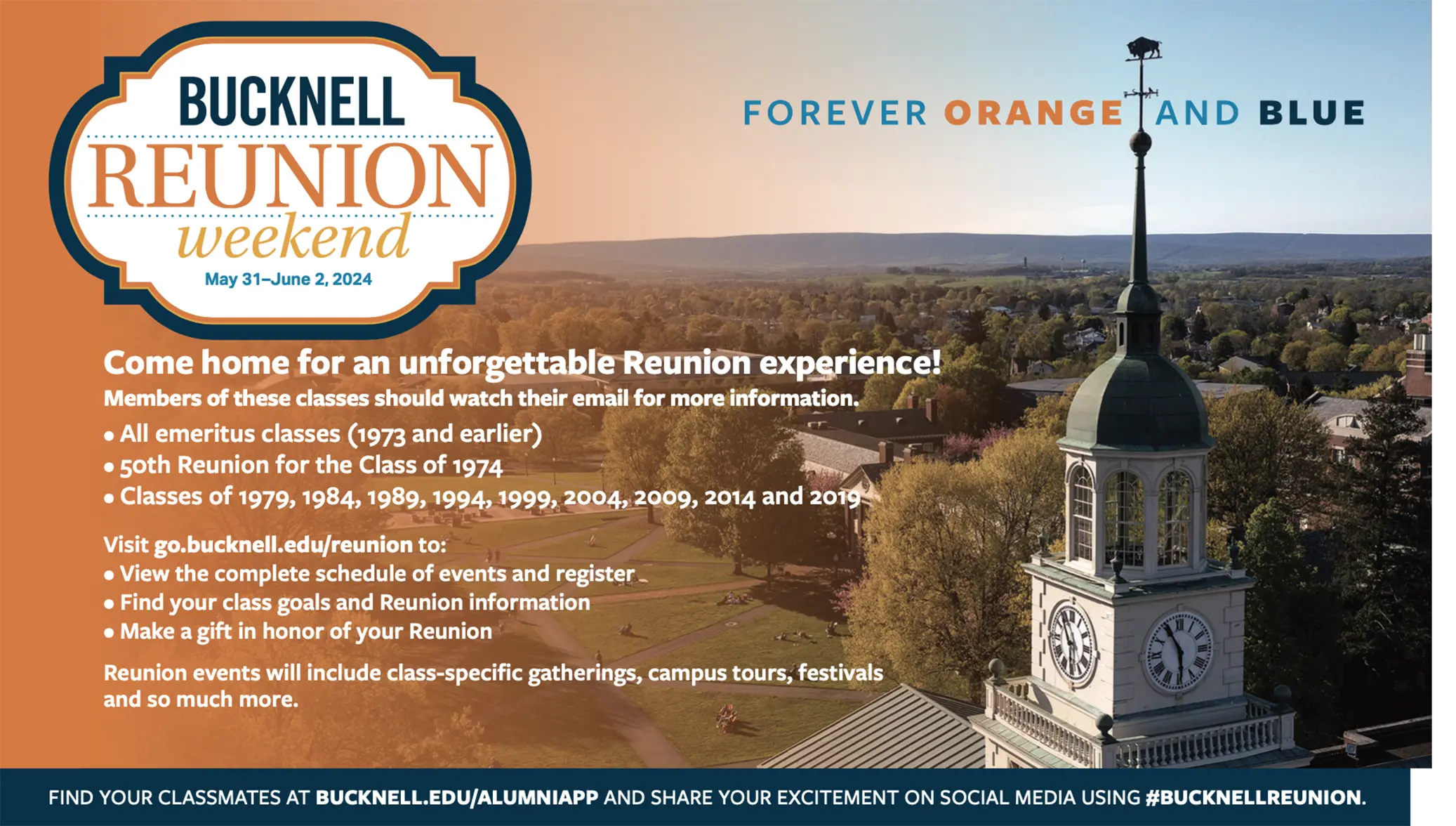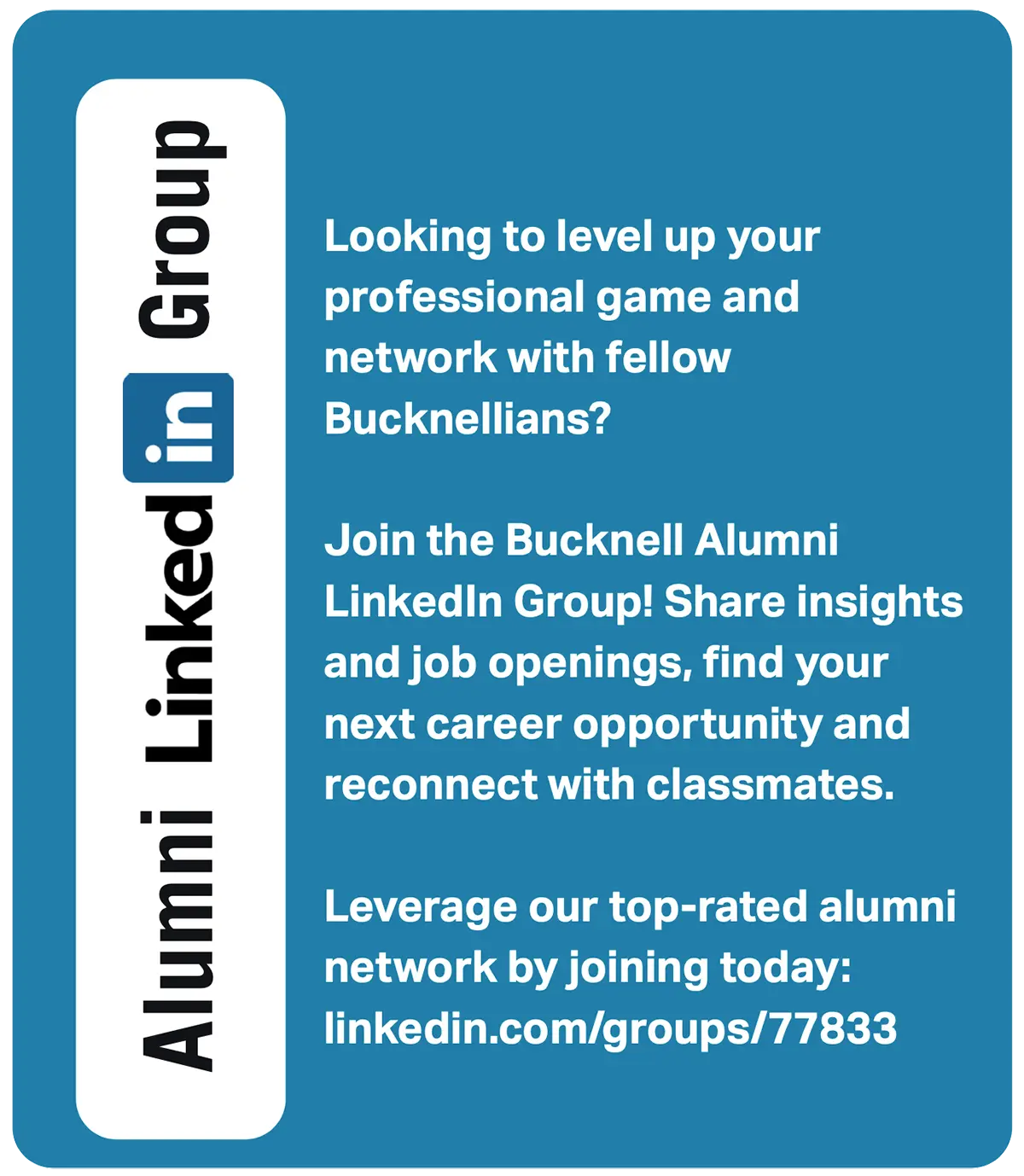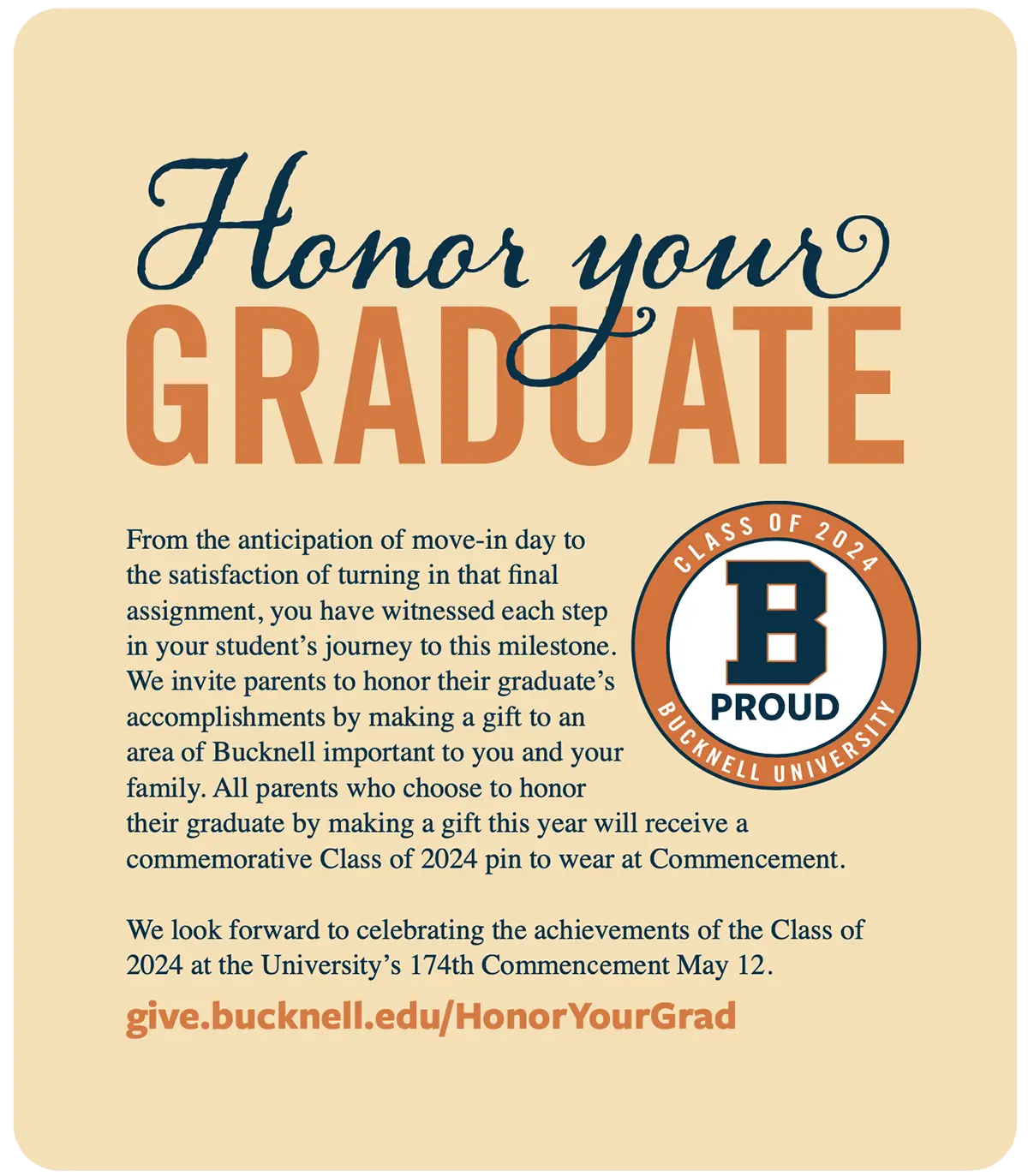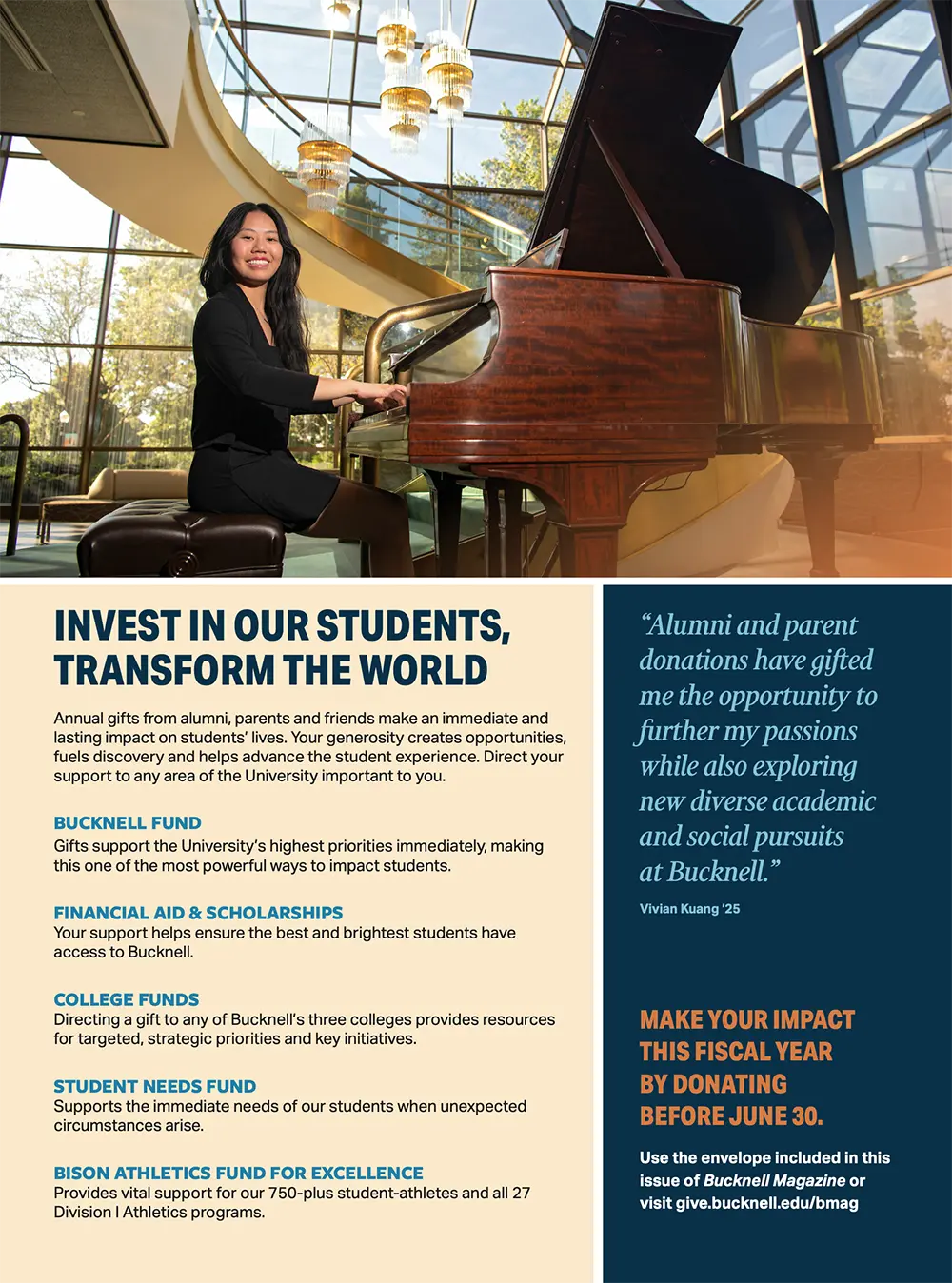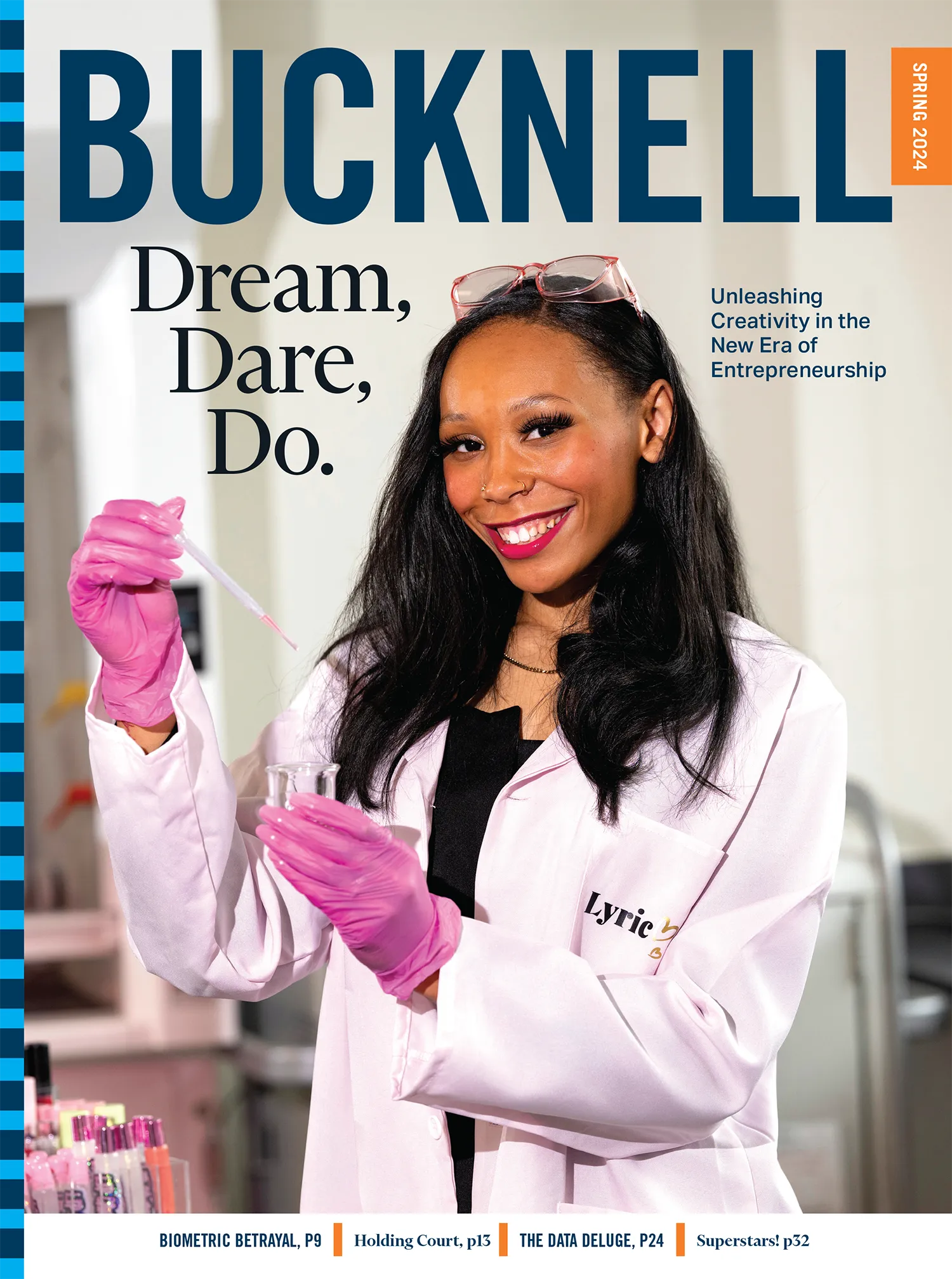
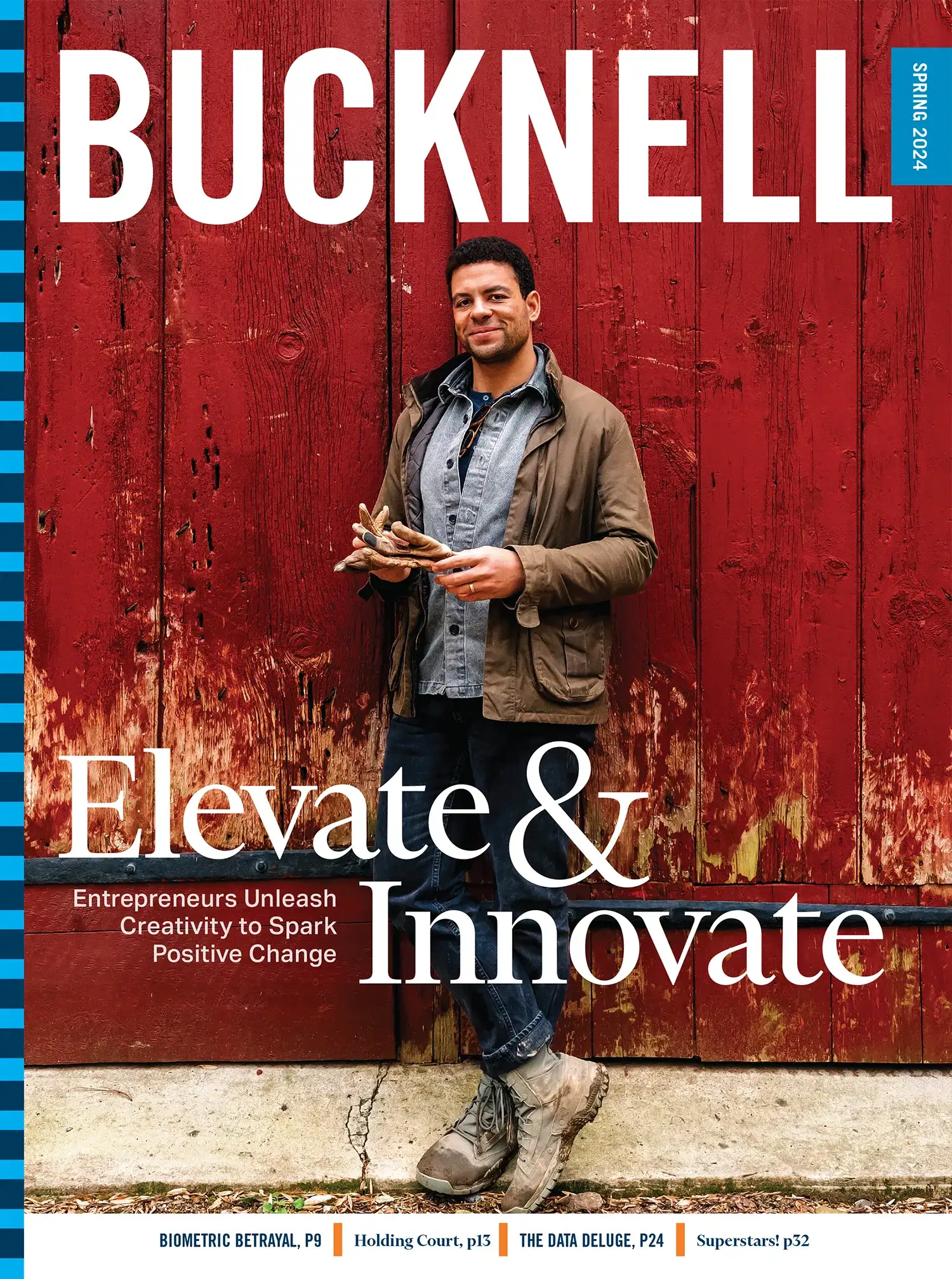
Sunbeams cast a warm glow as Bucknell’s campus blossoms into spring.
If you would like a reprint of this photo, please fill out the form at go.bucknell.edu/PhotoOffer. We will send you a complimentary 8×10 print.
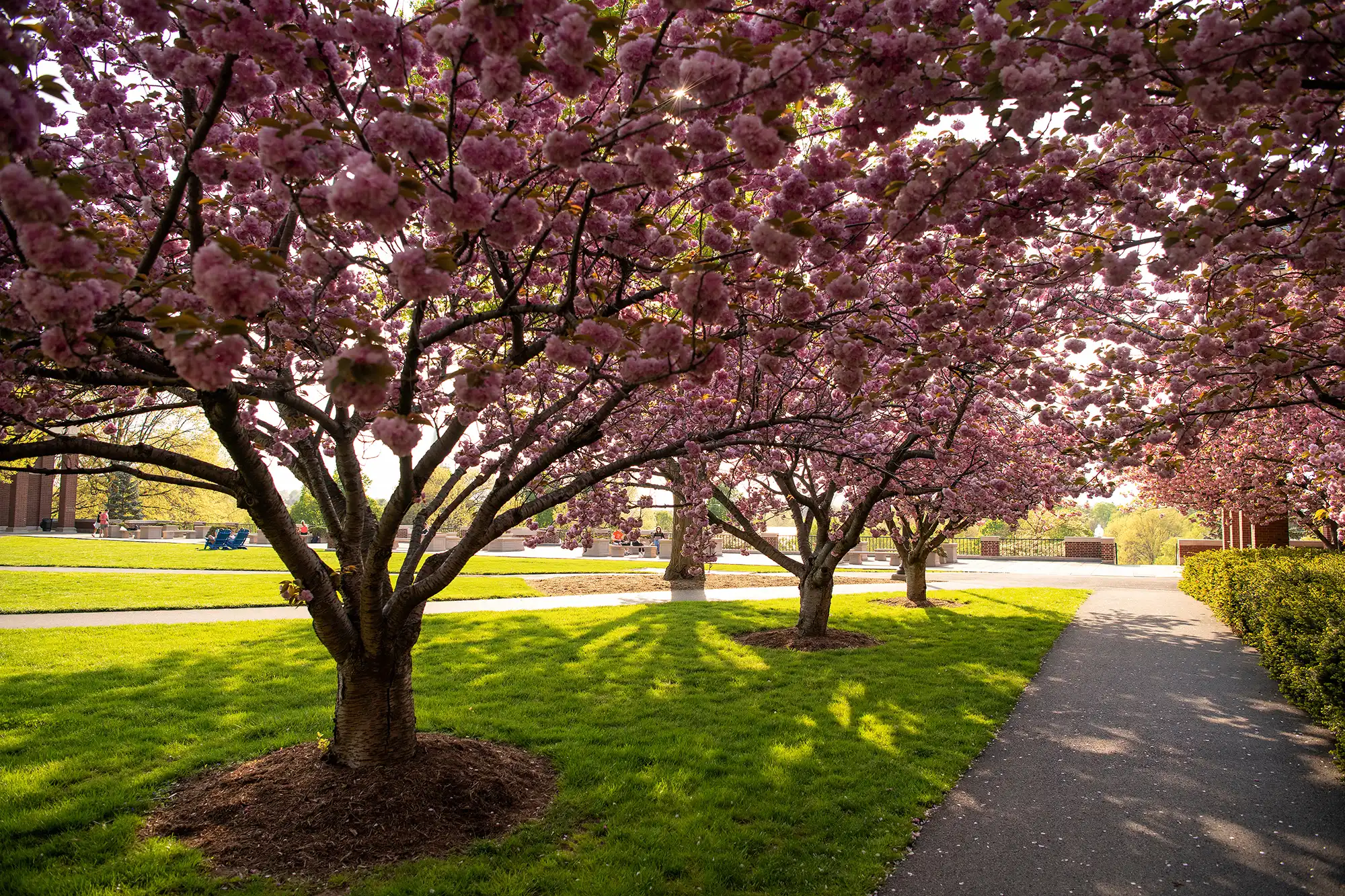
BY WAY OF BUCKNELL
Sunbeams cast a warm glow as Bucknell’s campus blossoms into spring.
If you would like a reprint of this photo, please fill out the form at go.bucknell.edu/PhotoOffer. We will send you a complimentary 8×10 print.
Pathways
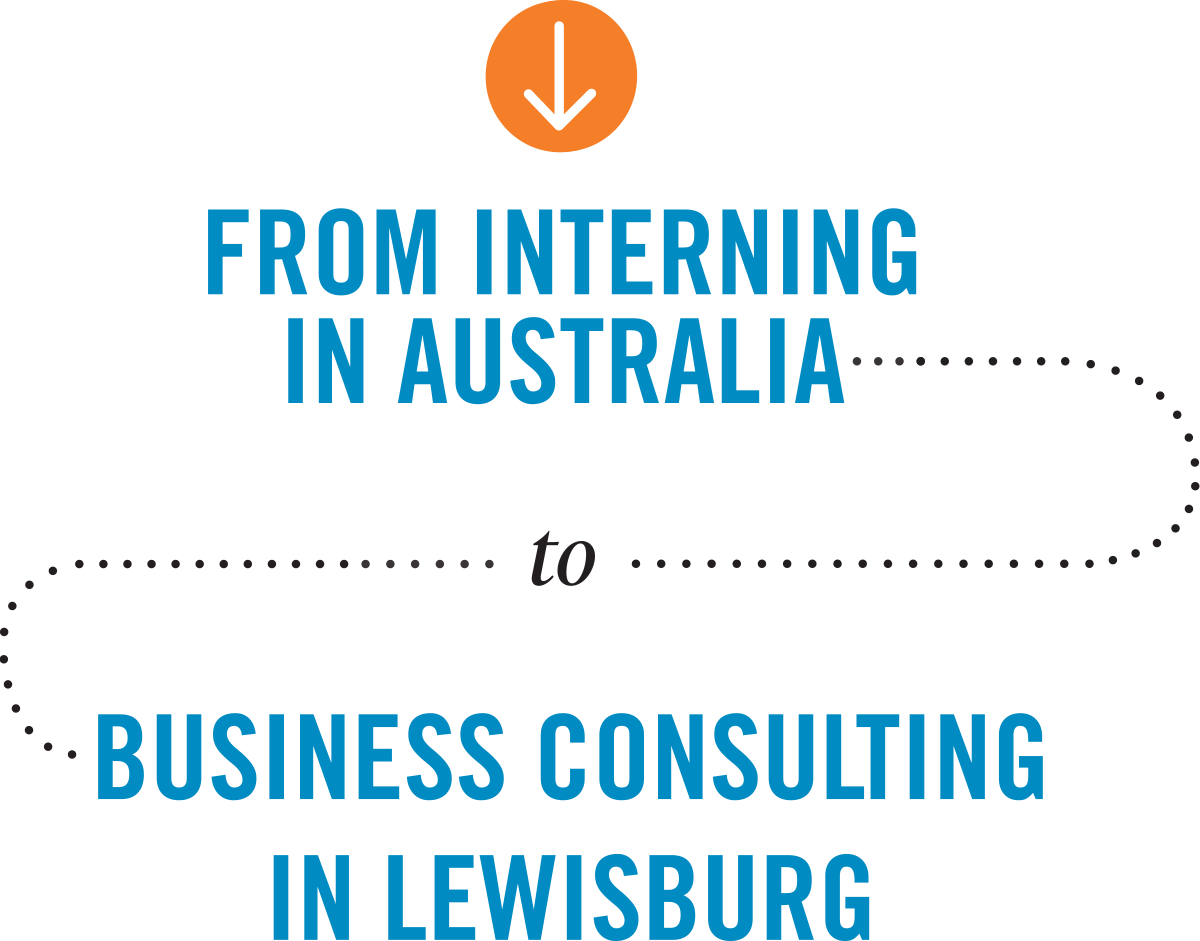
by Sarah Downey ’25
Encouraged by his mentor, Professor Andrew Stuhl, environmental studies & sciences, Fink enrolled in an environmentally focused study abroad program in Byron Bay, Australia, his junior year. While there, he secured an internship with 4 Pines Brewing Company and learned about sustainable brewing using locally sourced ingredients.
Eager to apply what he had learned abroad, Fink contacted Rob Antanitis of Civil War Cider in Lewisburg to see if he would collaborate on a low-waste beverage. Together, they developed Misfit Mashup Hard Cider, which is made from “ugly fruit” — produce that would otherwise be thrown out because it’s not attractive enough to be sold in grocery stores.
The beverage, which made its debut at the cidery in December, factors in every environmental impact, from emissions produced collecting fruit at local orchards to how much energy the storage freezer uses. “Bucknell gave me the ability to study in Australia and bring back what I learned to help support the local economy and create good vibes in the community,” Fink says. “It strengthened my interest in pursuing a career in sustainability.”
Gateway
From the Editor
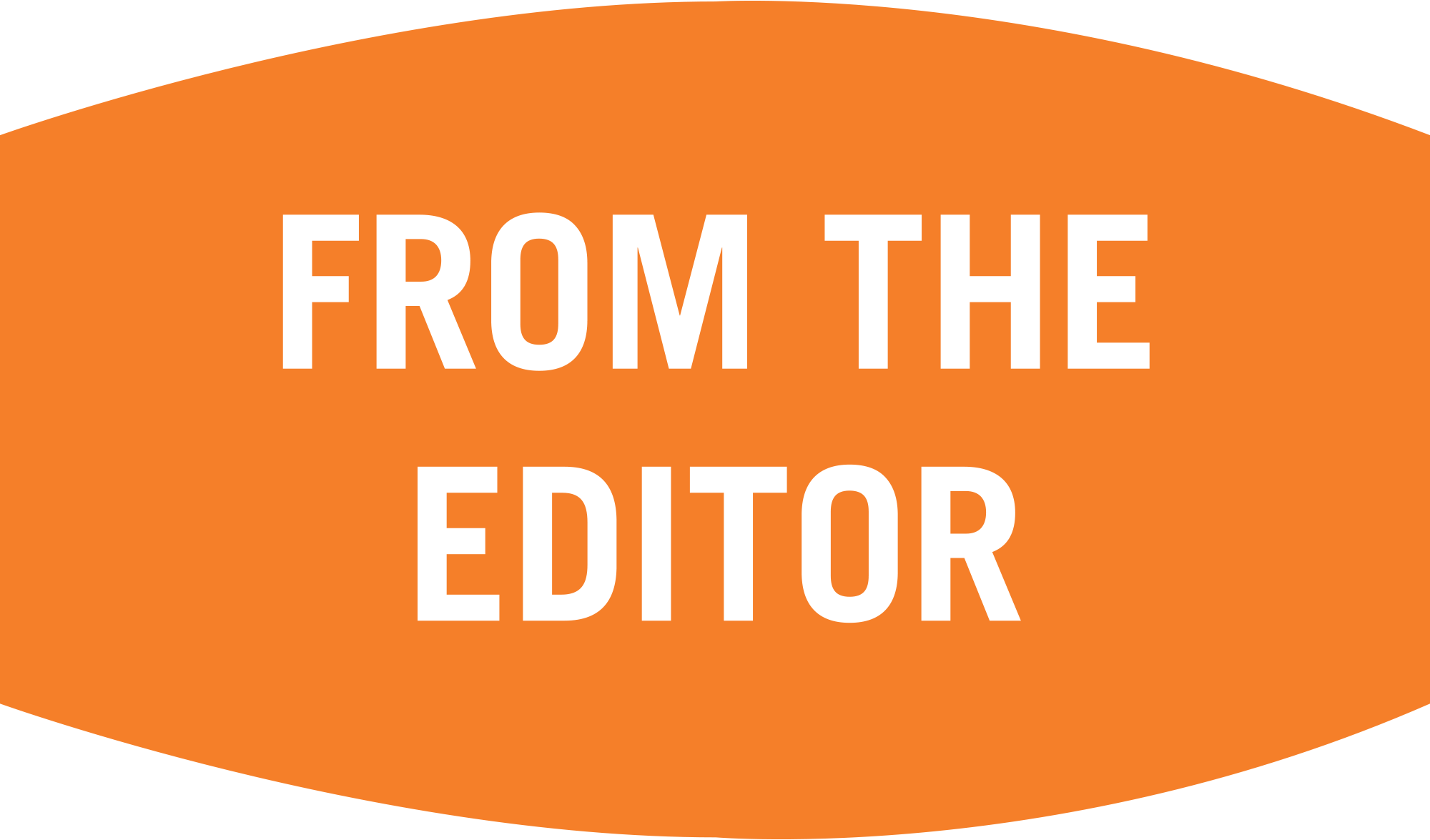
Double Vision
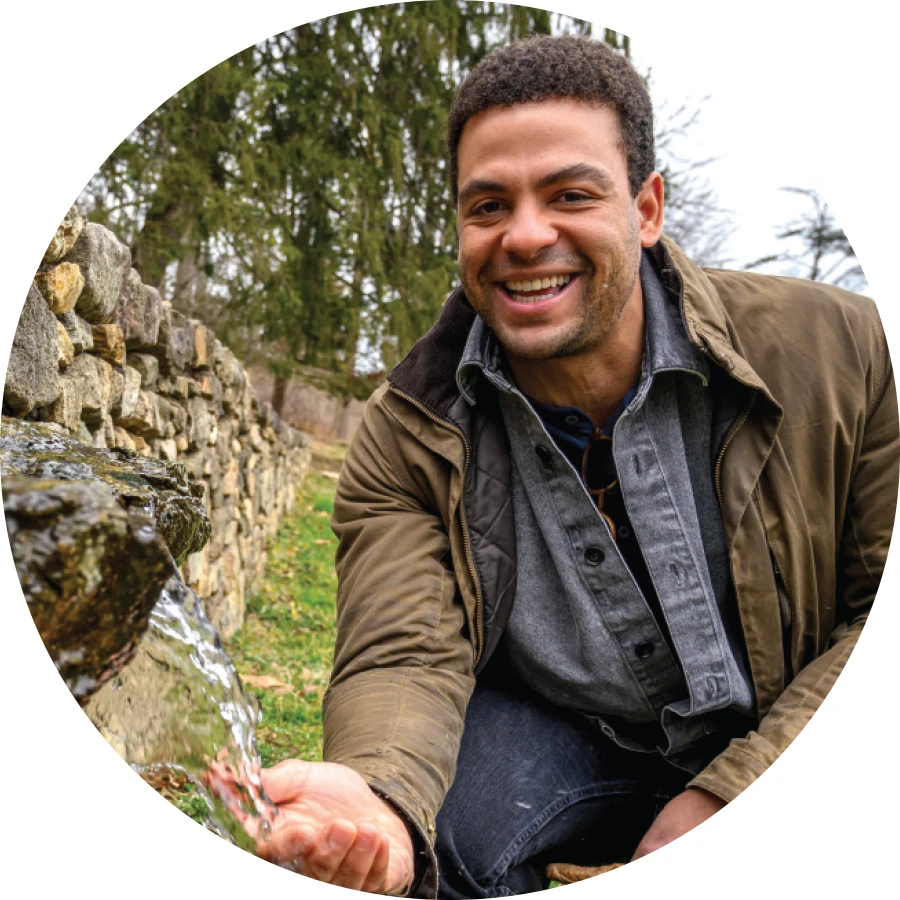
As we deliberated, a realization dawned upon us. We had a unique opportunity to celebrate both Bucknellians while emulating their innovative spirit and their willingness to experiment and take risks.
And so, the Spring 2024 issue of Bucknell Magazine has two covers. Half our audience is receiving a magazine featuring Sam Nana-Sinkam ’10 on the cover. Nana-Sinkam is part of the feature “Redefining Entrepreneurship”. After a successful career at Target and then at Google, Nana-Sinkam decided to pursue a different path in sustainable agriculture. His new focus is on increasing access to nutritious food while ensuring future generations can live within a healthy environment.
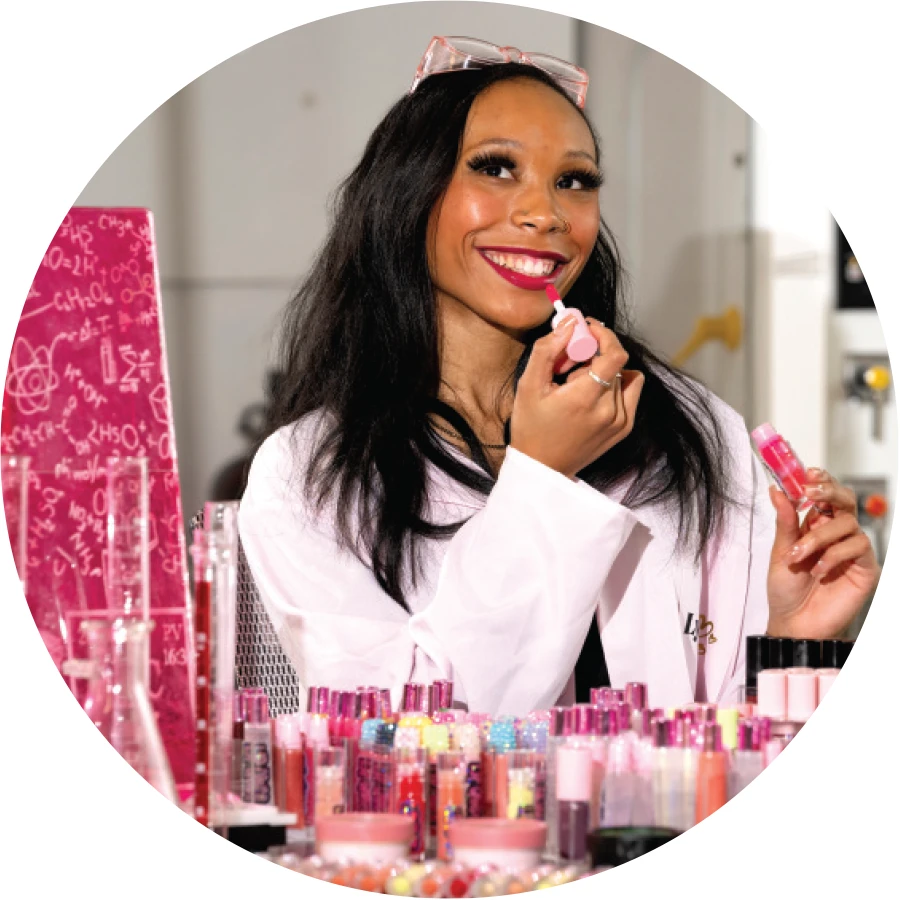
Katie Neitz, Editor
k.neitz@bucknell.edu
The Case for Equity
As someone who came to Bucknell from a rural foreign-language school outside the U.S., only to realize just how underprepared I was compared to some of my peers, I can personally relate to the case for equity. So-called “academic merit” more often than not is a reflection of the opportunities a prospective student has had to get to where they are, which tells me there needs to be a better way to define their true potential — one beyond academic performance.
The benefit of diversity, equity and inclusion for the University, its students and the advancement of our society as a whole is clear. I am glad Bucknell is leading the way to ensure underrepresented students not only have a shot at getting in but also thrive there, regardless of where they happen to come from.
I hope the students are experiencing positive change in this area, and if not, that they demand more progress to be made.
Masha Zhdanova ’13
Amsterdam
Social Pulse
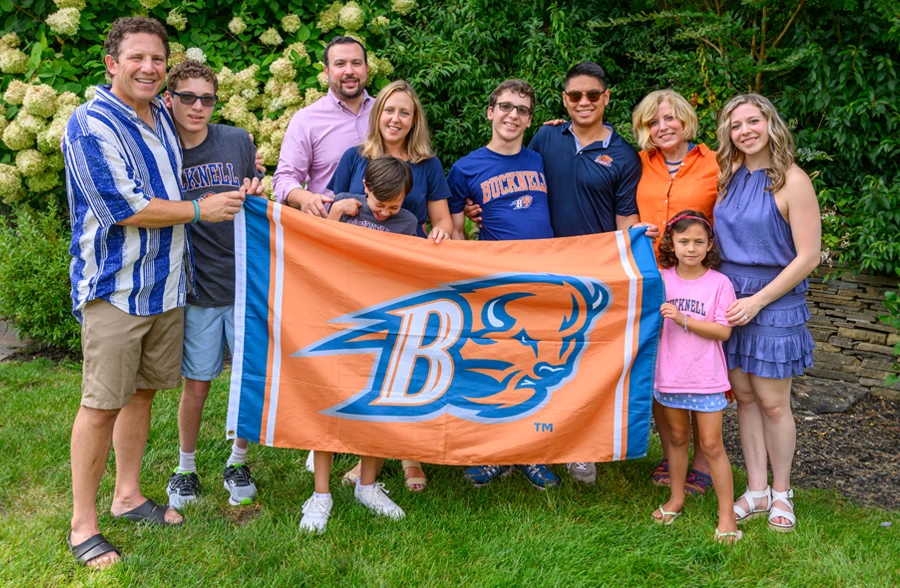
Marisa Matascusa Law ’90, P’21
Harleysville, Pa.
Wow! Love this story. Amazing how much has been accomplished by the parents. Very lucky boys!
Linda Jackson ’68
Hilton Head Island, S.C.
Courage Under Fire
Siobhan Murray ’15
Corvallis, Ore.
Table of Contents

Volume 17, Issue 2
Heather Johns P’27
EDITOR
Katie Neitz
CREATIVE DIRECTOR
Barbara Wise
DESIGNERS
Kory Kennedy Design
(features, covers)
Amy Wells
(Gateway, Class Notes)
PHOTOGRAPHY EDITOR
Emily Paine
ASSISTANT EDITOR
Matt Jones
DIGITAL EDITOR
Brooke Thames
Heidi Hormel
EDITORIAL ASSISTANT
Kim Faulk
Contributors
Dave Block, Megan Collins ’24,
Sarah Downey ’25,
Shana Ebright, Mike Ferlazzo,
Matt Hughes, Brad Tufts,
Christina Masciere Wallace P’22,
Kate Williard
Website
bucknell.edu/bmagazine
Contact
bmagazine@bucknell.edu
Class Notes:
classnotes@bucknell.edu
570-577-3611
(ISSN 1044-7563), of which this is volume 17, number 2, is published in winter, spring, summer and fall by Bucknell University, One Dent Drive, Lewisburg, PA 17837. Periodicals Postage paid at Lewisburg, PA and additional mailing offices.
Permit No. 068-880.
Circulation
49,000
Postmaster
Send all address changes to:
Office of Records
301 Market St., Suite 2
Bucknell University, Lewisburg, PA 17837
© 2024 Bucknell University
Literary Liberty
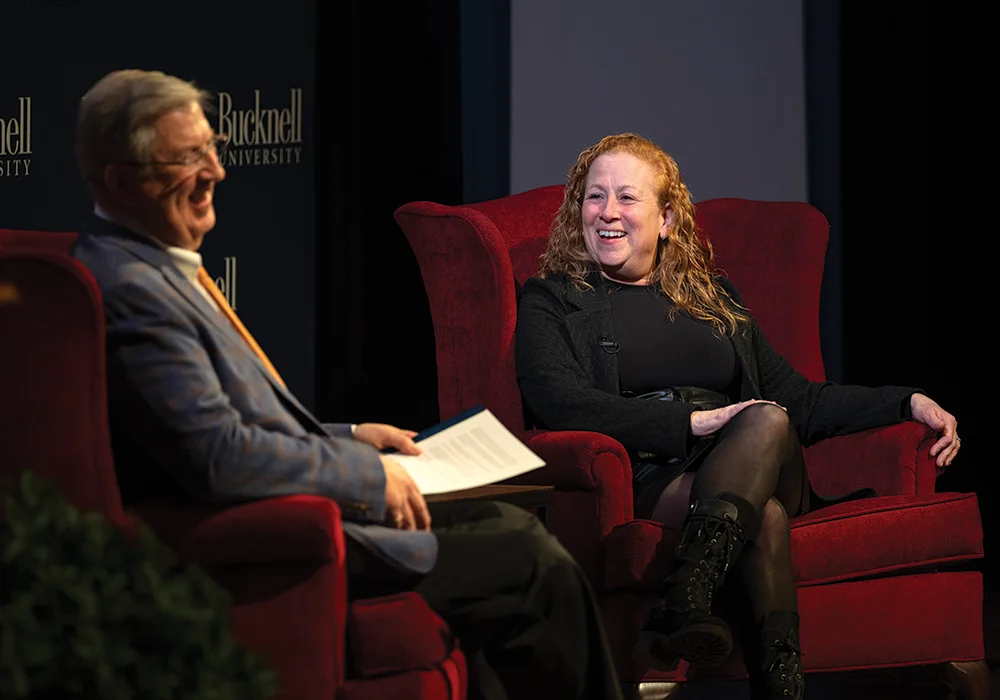

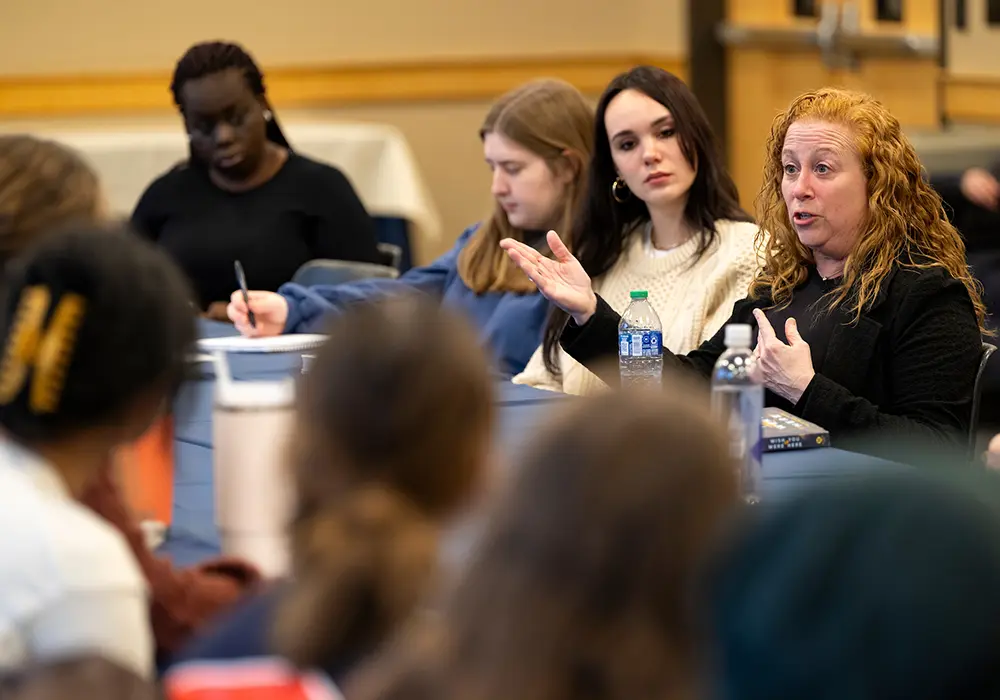

The Bucknell Forum speaker series continued with award-winning writer, activist and New York Times-bestselling author George M. Johnson, who spoke on campus Feb. 27. The final speaker of this year’s series was Academy Award-winning actor and activist Jane Fonda, who addressed the campus community March 19.
President Bravman Joins Council on Competitiveness
“The Council on Competitiveness recognizes the critical role of higher education in meeting the challenges and needs of an increasingly diverse workforce and evolving economic landscape,” says Bravman. “I am passionate about the enduring value of the liberal arts as a foundation for professional success and honored to share this perspective as a member of the council. This distinguished group represents a wide variety of public and private sector interests with a common goal, and I look forward to gaining new insight that will help inform how Bucknell prepares future generations of leaders.”
The council has a general membership of roughly 80 academic and business leaders and maintains partnerships with universities, corporations and national labs throughout the country. Bravman’s reputation as a highly respected academic and one of the longest-serving presidents at Bucknell, an institution that has a rich tradition in the liberal arts while embracing a forward-thinking culture of innovation, positions him as a leader who can bring unique value to the council.
News Ticker
Big in Business
We Mean Green
no surprises
’burg and Beyond
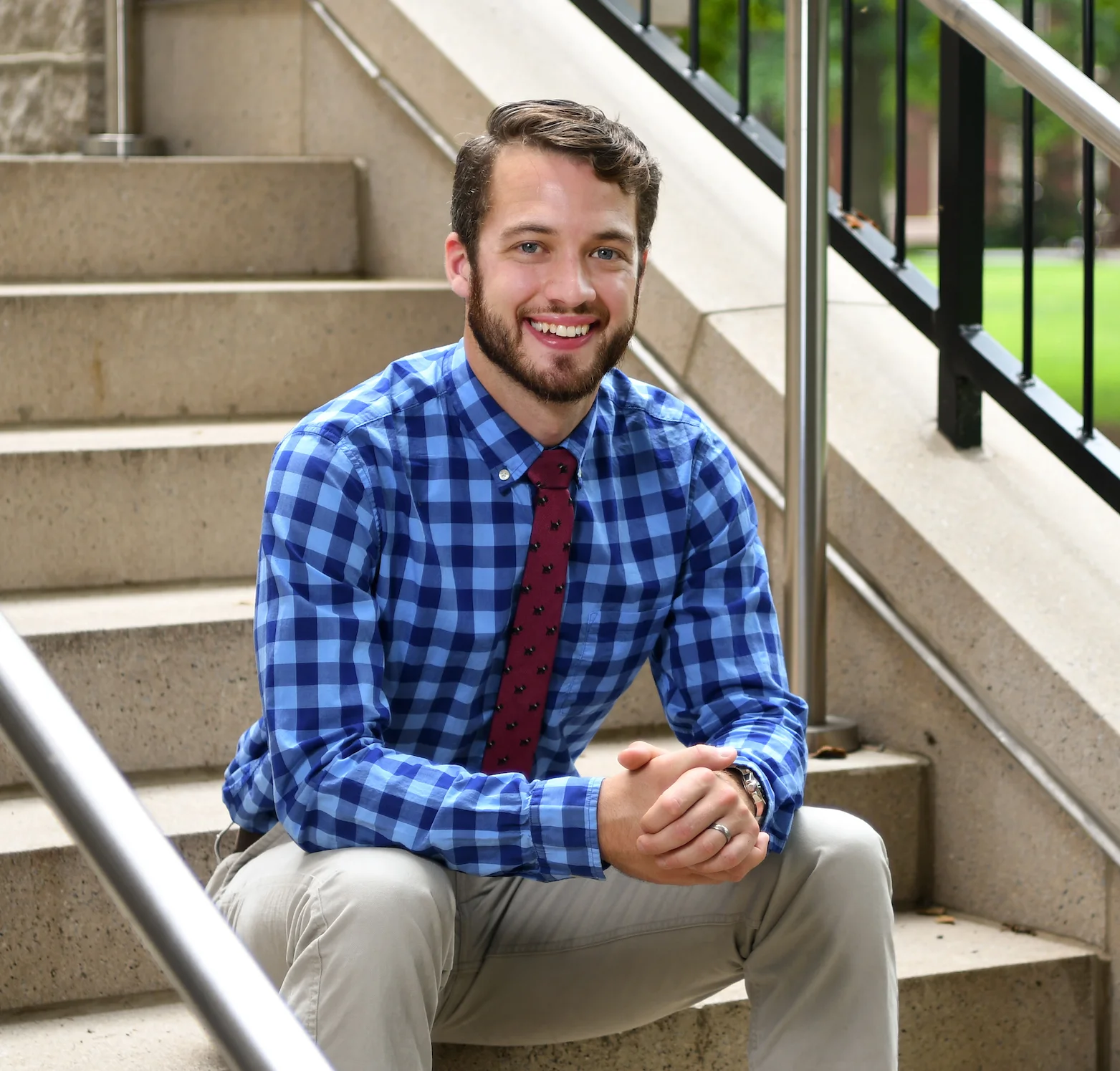


Lewisburg
As a fellow with Geisinger Health System, Professor Benjamin Wheatley, mechanical engineering, is working with AposHealth to deliver an innovative, non-invasive, drug-free treatment for patients with knee pain and conditions such as osteoarthritis.
What They Did
Apos developed biomechanical footwear — a shoe patients wear for an hour a day while going about their routine. From most angles, it appears to be a typical sneaker. But look at the sole, and you’ll see two convex cushions. The discs improve the alignment of users’ muscle forces and their gait, which takes pressure off their knees while training them to walk with better form. The result is diminished pain and decelerated joint damage.
AROUND TOWN AND AROUND THE GLOBE
’burg and Beyond
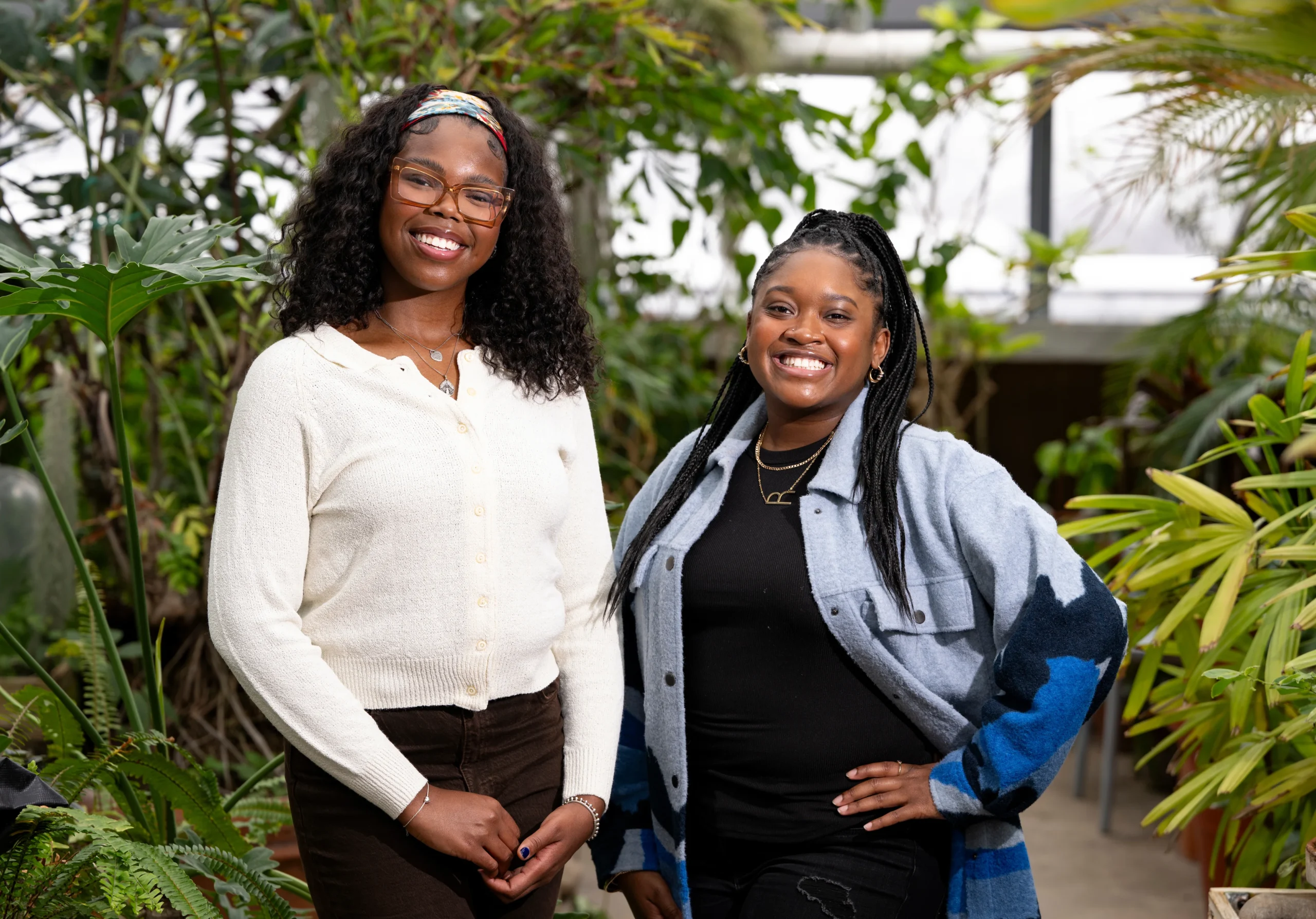


Coal Township, Pa.
In 2022, Reece Pauling ’24, an environmental studies and critical Black studies double-major, launched a horticultural therapy program at the State Correctional Institution in Coal Township to equip incarcerated individuals with gardening skills that can help with their post-release reintegration. The benefits of the program extend beyond the prison walls. The flowers grown are donated to residents of local nursing homes and rehabilitation centers.
Measuring Results
This past fall, Christa Starghill ’24, a psychology and women’s & gender studies double-major, collaborated with Pauling to study the project’s impact. She found that the garden not only changed the prison’s environment, but it also improved individuals’ mental health. “One man told me that he became more grounded and calm after working in the garden,” she says. “The garden lightens the atmosphere of the entire prison. It’s cultivating beauty everybody benefits from.”
Bucknell Names New Provost
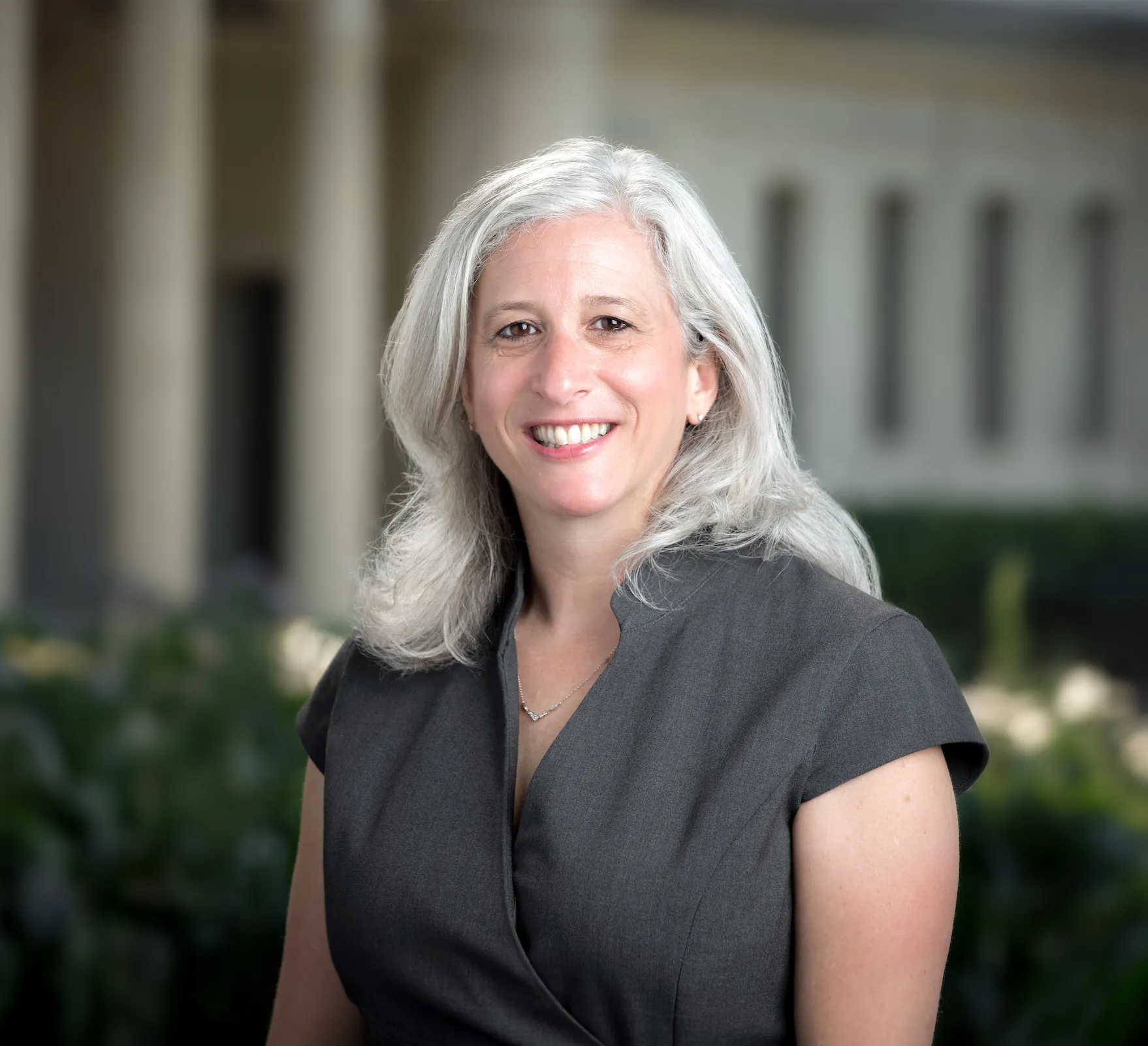

Her tenure of nearly seven years at Occidental, coupled with her prior roles as the dean of academic departments and programs at Union College from 2013 to 2017 and as associate provost at Haverford College from 2008 to 2012, resonated strongly with the Bucknell students, faculty and staff who participated in the selection process.
“In an extremely competitive field of candidates, Wendy’s combination of administrative experience and deep commitment to the liberal arts distinguished her as ideally equipped to guide our academic program and ensure its continued success,” Bravman says.
Throughout her career, Sternberg has demonstrated steadfast advocacy for interdisciplinary education, a commitment to decision making rooted in data and equity, and a dedication to fostering inclusive campus environments that honor the dignity of every individual.
Sternberg earned a bachelor’s degree in psychology from Union College and both a master’s and doctorate degree in psychology from UCLA, where she was also a postdoctoral fellow in the Department of Psychiatry and Biobehavioral Sciences. Her research program on the psychobiological underpinnings of pain served as a training ground for hundreds of undergraduate students and contributed important conceptual findings to the field.
“I’m delighted to be joining the Bucknell community. Bucknell is an institution I have long admired for its commitment to the liberal arts in all forms and its emphasis on preparing students for lives and careers of meaning and purpose,” Sternberg says. “I look forward to working with Bucknell’s faculty, students and staff in ushering in the University’s next chapter.”
Sternberg’s anticipated start date is July 1. Interim Provost Margot Vigeant will continue in the role until then.
Freeman College Dean Announced
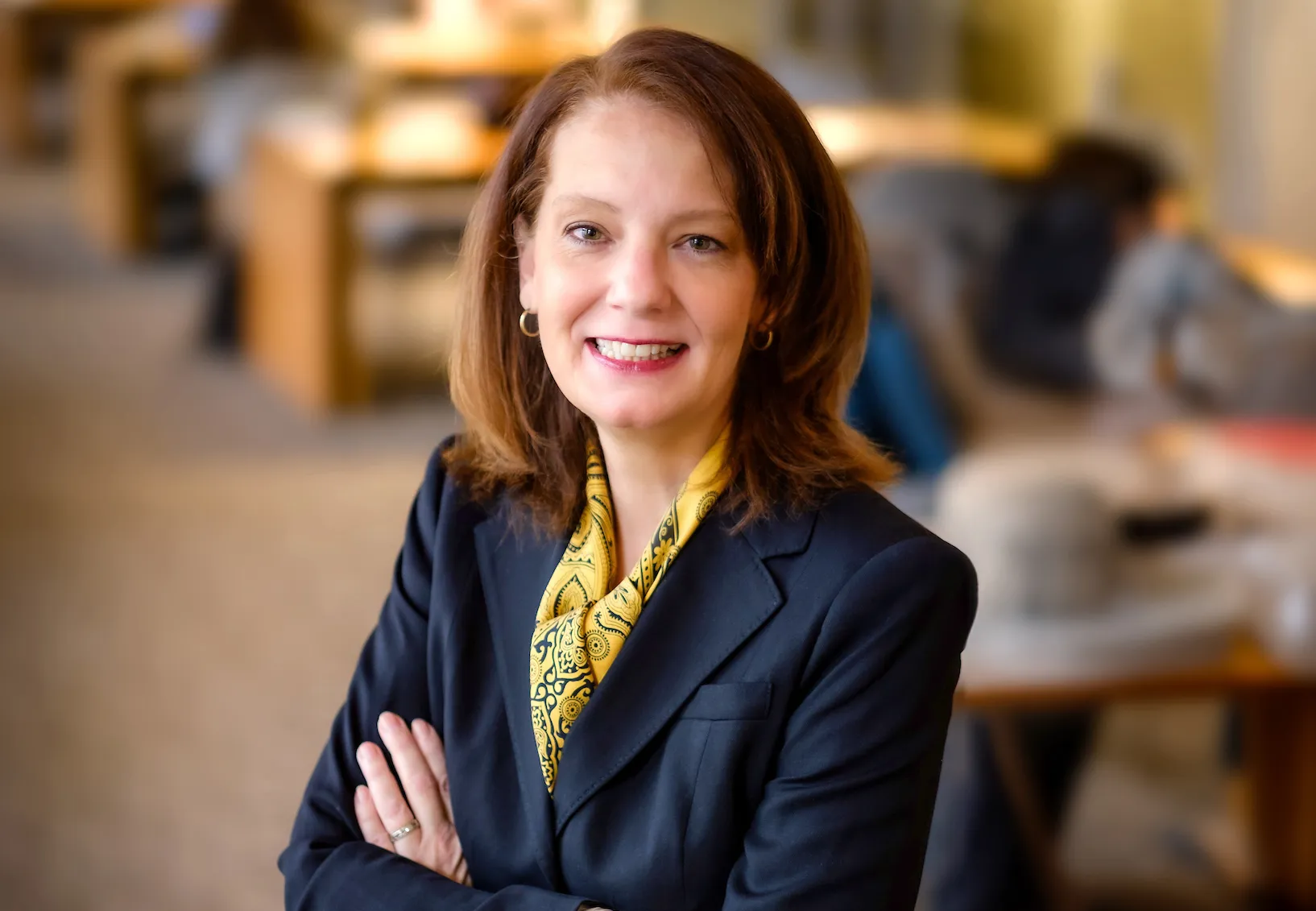

During her tenure at Wake Forest, Roehm managed a 160-person faculty and staff team, oversaw eight degree programs, and earned recognition for her expertise in data and analytics.
A professor at the Wake Forest School of Business since 1997, Roehm served in several leadership roles after joining the school’s senior administrative team in 2008, providing strategic direction to academic centers, pre-experience programs and faculty across academic disciplines. She recently led the school’s strategic visioning process with business school faculty, staff and the school’s Board of Visitors. In 2008, she was named Educator of the Year by Wake Forest’s evening MBA students.
“It is a tremendous honor to join the Freeman College of Management as dean,” Roehm says. “I look forward to enthusiastically collaborating with students, faculty, staff and members of the larger Bucknell community to carry forward the rich legacy of learning and discovery at the intersection of management education and the liberal arts.”
Roehm earned her bachelor’s in communications as well as a master’s in communications from the University of Illinois at Urbana-Champaign. She earned her doctorate in marketing from Northwestern University.
Interim Dean of the Freeman College of Management Cindy Guthrie will continue to guide the college until Roehm’s July 1 start date.
Nadia Sasso ’11 to Headline Bucknell’s 174th Commencement Ceremony
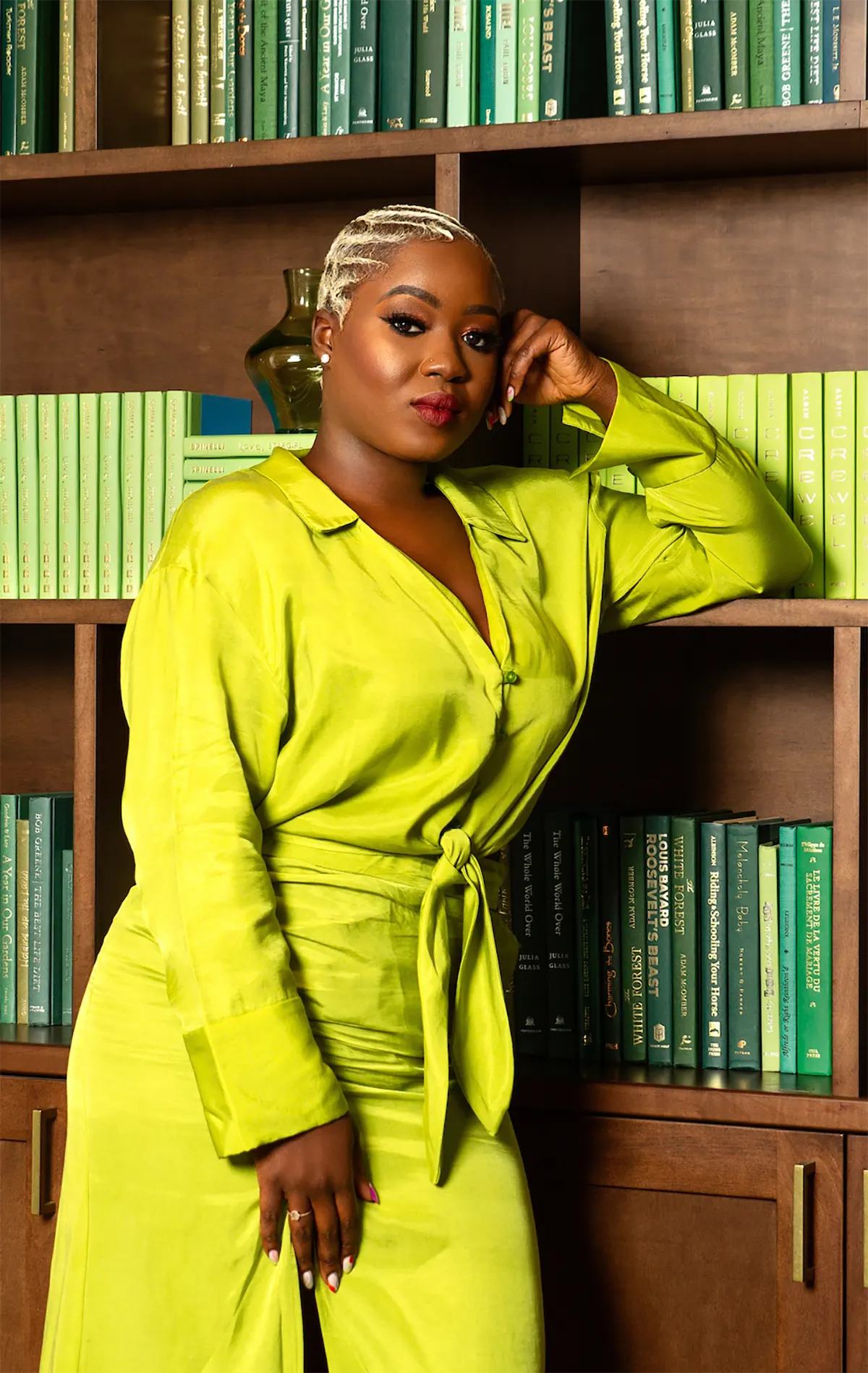

Sasso’s commitment to furthering inclusivity in the entertainment industry is manifested in her app BlaytorBox, which connects companies, brands and filmmakers to Black, Indigenous and other people of color professionals working in creative fields. The BlaytorBox project earned her a semifinalist position for the Black Ambition Prize, which provides capital and resources to startups founded by Black and Hispanic entrepreneurs.
Through her entrepreneurial and creative ventures along with her passion for making connections, Sasso has worked with award-winning actress, writer and producer Issa Rae; New York Times-bestselling Nigerian-American author Luvvie Ajayi Jones; and award-winning journalist and filmmaker/producer Jose Antonio Vargas. She also has led creative campaigns working with such clients as Viacom, Nielsen, UBS, the Peace Corps and the United Nations. She has leveraged her background in diversity, marketing, communications and new media with the White House, the Smithsonian and universities around the world.
“Nadia is a gifted entrepreneur who has combined her talents and liberal arts education to find exceptional success at the intersection of communication and technology,” says President John Bravman. “Her global perspective and passion for social issues will no doubt inspire Bucknell’s newest graduates as they embark upon their own careers.”

Should You Use Your Face to Unlock Your Phone?
Professor Rajesh Kumar, computer science, and his students research the interaction patterns between smart devices and humans to develop fair and robust layers of security for our smart devices.
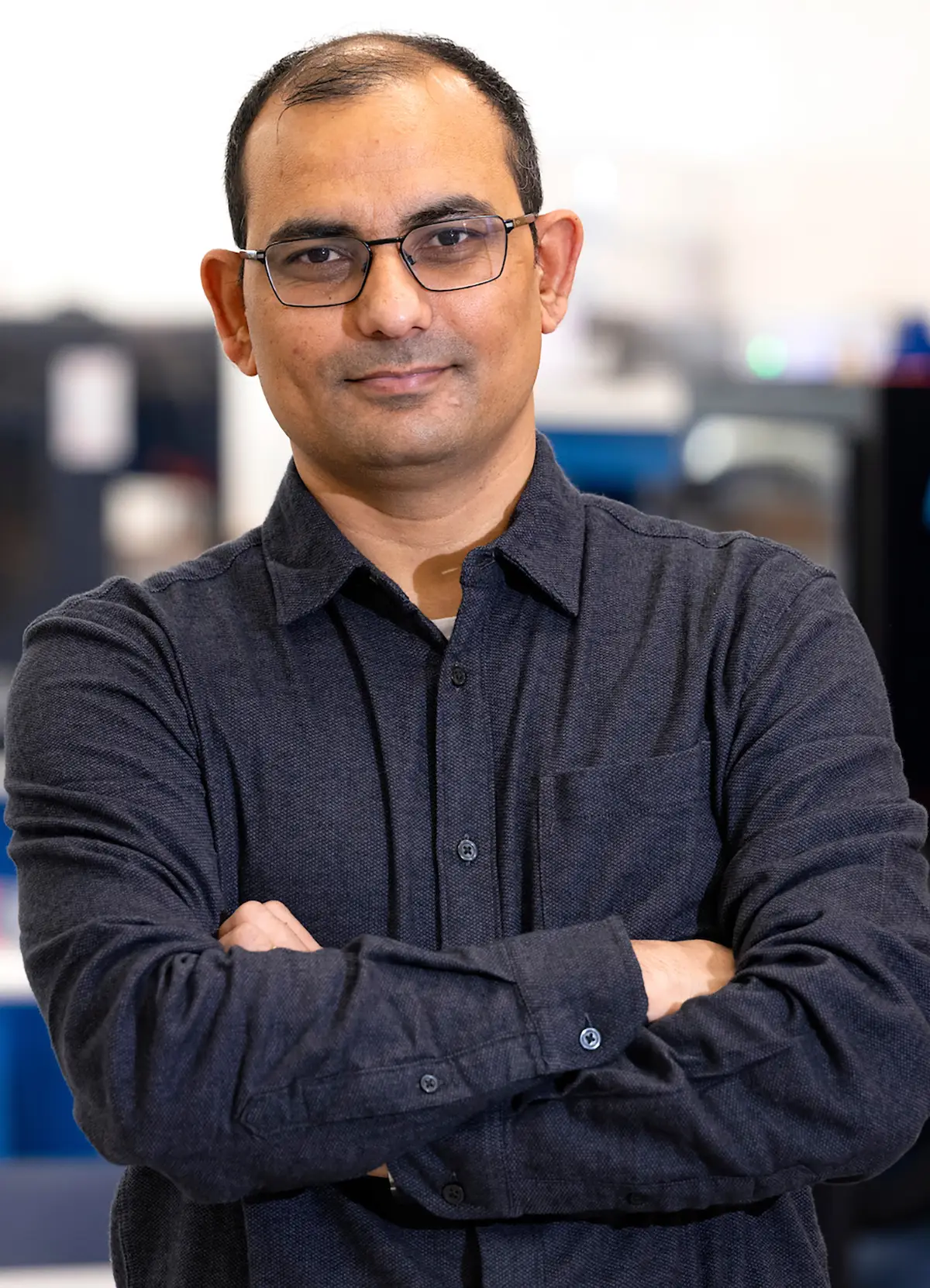

However, these methods are not foolproof. The underlying algorithms could be biased, favoring lighter-skinned faces. This can be due to underrepresentation in development teams, implicit biases in data annotation, and the influence of historical imbalances in representation. Relying on one authentication layer — such as facial features alone — makes your device and all the information it contains vulnerable.
The future of device safety lies in creating a layer of security that uses behavioral biometrics. Our unique interactions with devices, such as swiping across screens, can confirm our identities definitively and in real time.
Embedded sensors in smart devices, such as phones, watches and headsets, can measure the nuances of our movements, touch and typing. Gait analysis, which discerns how we walk, for instance, could usher in a keyless future where drivers unlock their cars with their stride.
By continually assessing the movements of our bodies, behavioral biometrics also promise to improve how we monitor our health. Smart devices can track disruptions to normal patterns, such as Parkinson’s, seizures and falls, to develop timely responses from medical professionals.
From Page to Stage
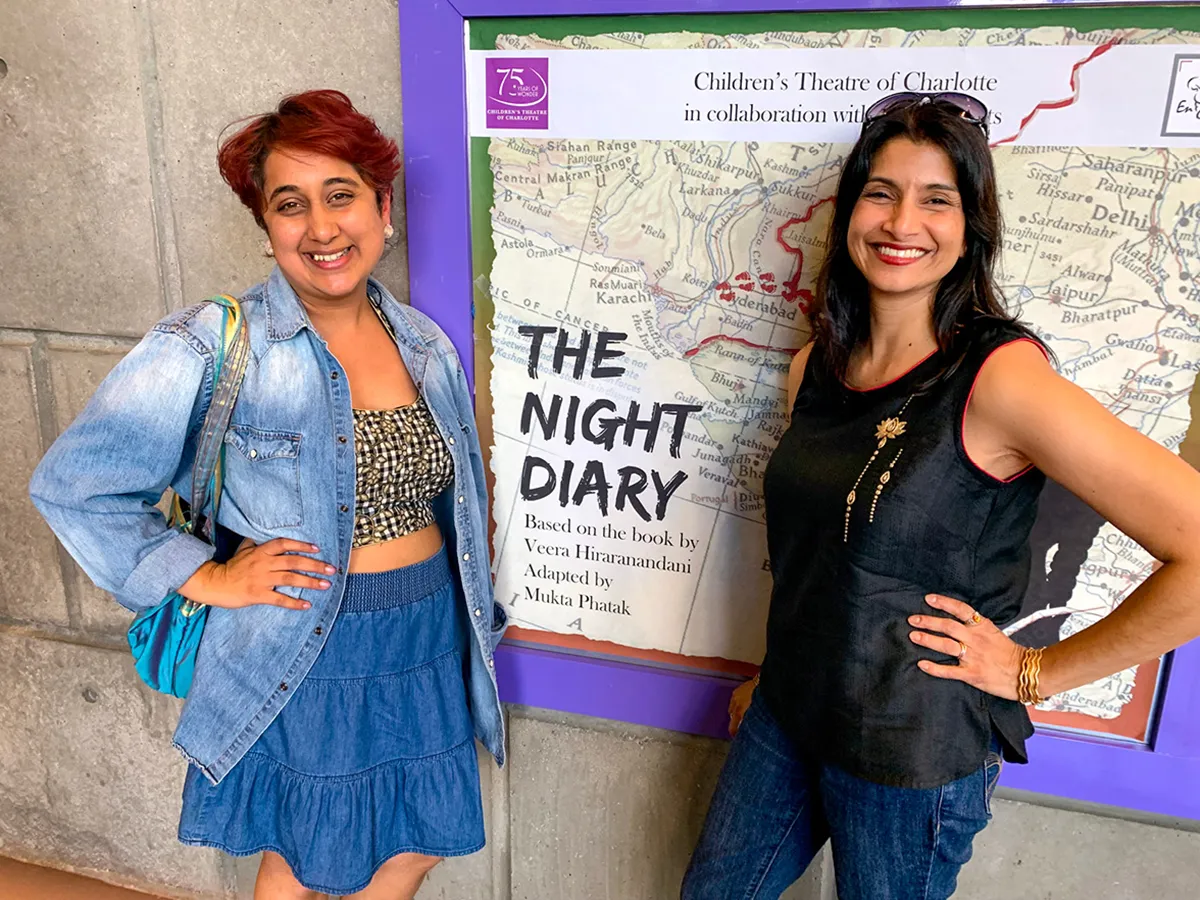

t started with a library book Professor Anjalee Deshpande Hutchinson, theatre & dance, read with her daughter. Little did she know it would become a project that’s drawn Hutchinson and Mukta Phatak ’18 into a creative partnership that’s helping Indian and Pakistani families grapple with a tragic era in world history.
Veera Hiranandani’s The Night Diary, a chapter book written for fifth- through eighth-graders, tells the story of two children caught up in the Partition, a monumental event in Indian and Pakistani history in 1947. When the British discontinued their control over much of South Asia, the vast territory was divided into two independent countries — Hindu-majority India and Muslim-majority Pakistan — which uprooted an estimated 18 million people and set off a horrific period of violence that caused at least 2 million deaths. Rarely taught in history classes in America, it’s still known as the largest forced human migration in recorded history.
Hutchinson was struck by the story, in which twins Nisha and Amil, born to a Muslim mother who died in childbirth and a Hindu father, are forced to flee with their father to escape imminent persecution. Nisha tells her late mother what’s happening by writing in her diary every night, struggling with issues of identity, belonging and home.
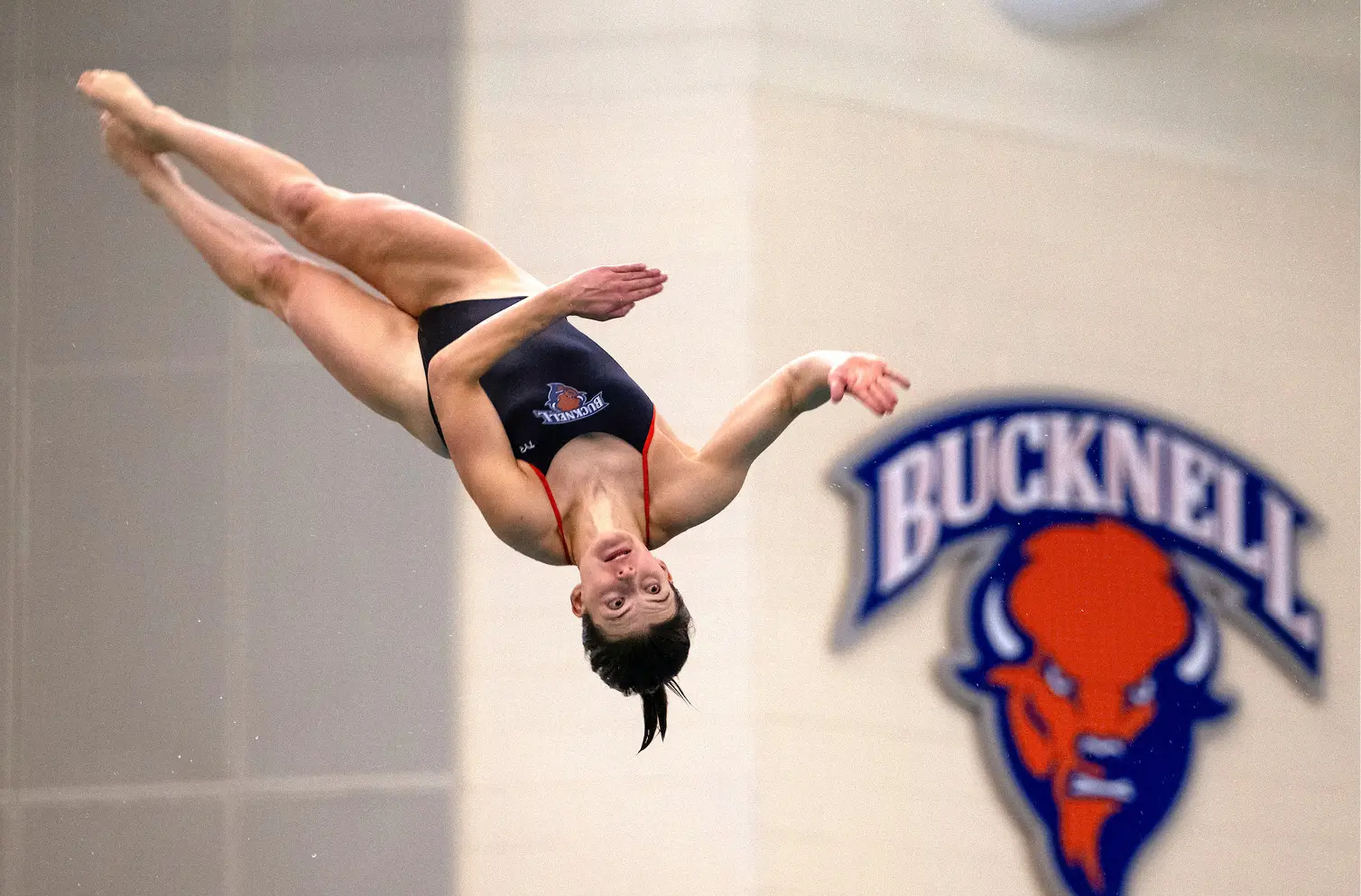

A Plot Twist
In March 2023, Catherwood represented Bucknell as a sophomore at the NCAA Zone A Diving Championships, a significant accomplishment that required consistent high-level performances throughout the season. Catherwood was the first Bison diver to qualify in nearly a decade (following Katie Hetherington ’15, who competed in 2012).
Catherwood was considered a latecomer to the sport when she transitioned to her Monroe-Woodbury, N.Y., high school diving team as a freshman. Everything that made her successful as a USA Gymnastics Level 9 athlete — strength, control, discipline, focus — carried over to the natatorium.

Bison Ballers
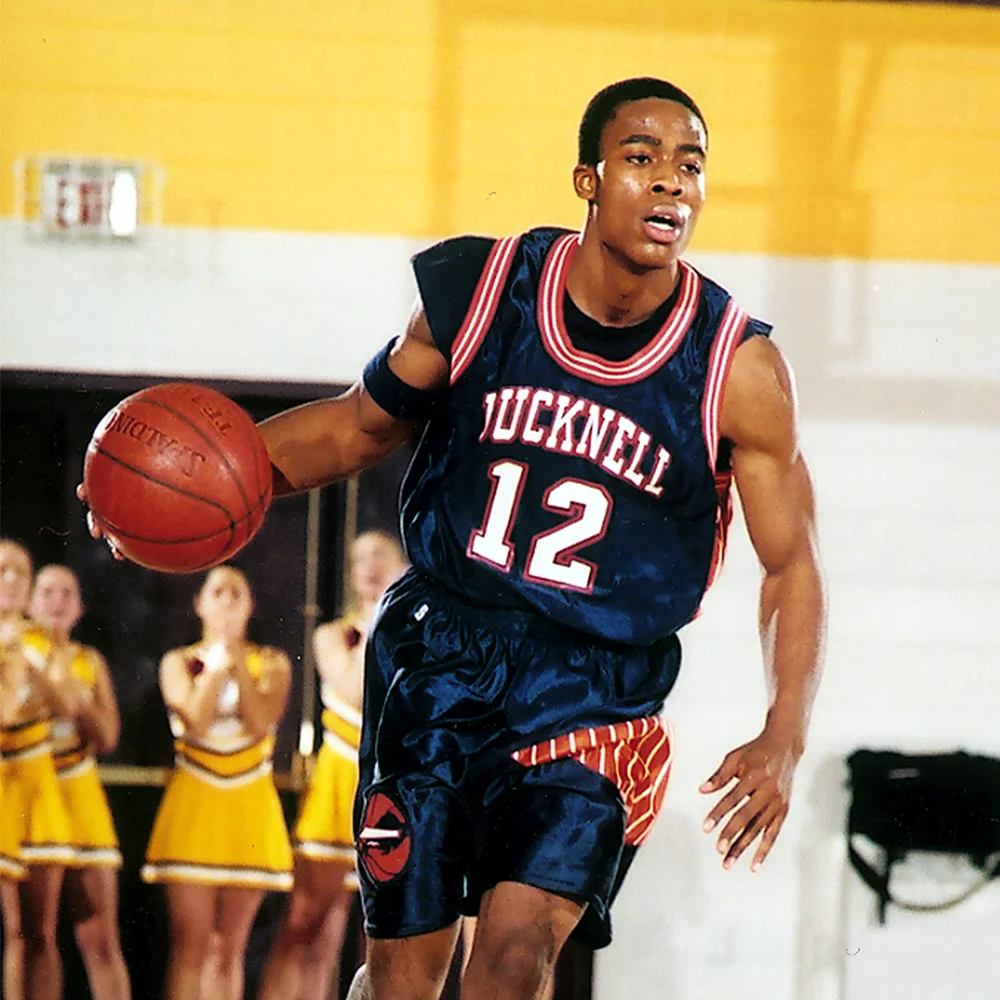
Bryan Bailey ’02, assistant coach, Atlanta Hawks
Going Pro Following a 13-year professional career in Europe, Bailey and his brother Mo created a basketball training company near Philadelphia. Bailey found he loved developing young talent. “Getting to coach players and be immersed in the sport — I just love it,” he says. “It never feels like work.”
Inside the Job Each NBA assistant coach has a specific role — plays to watch, athletes to develop (one of Bailey’s is All-Star Trae Young) and teams to scout. When analyzing an upcoming opponent, Bailey watches that team’s five most recent games, scrutinizing 240 minutes of footage and blending his subjective impressions with the objective stats that quantify every action on the court.
Dream Funding
by Kate Williard
photography by Emily Paine
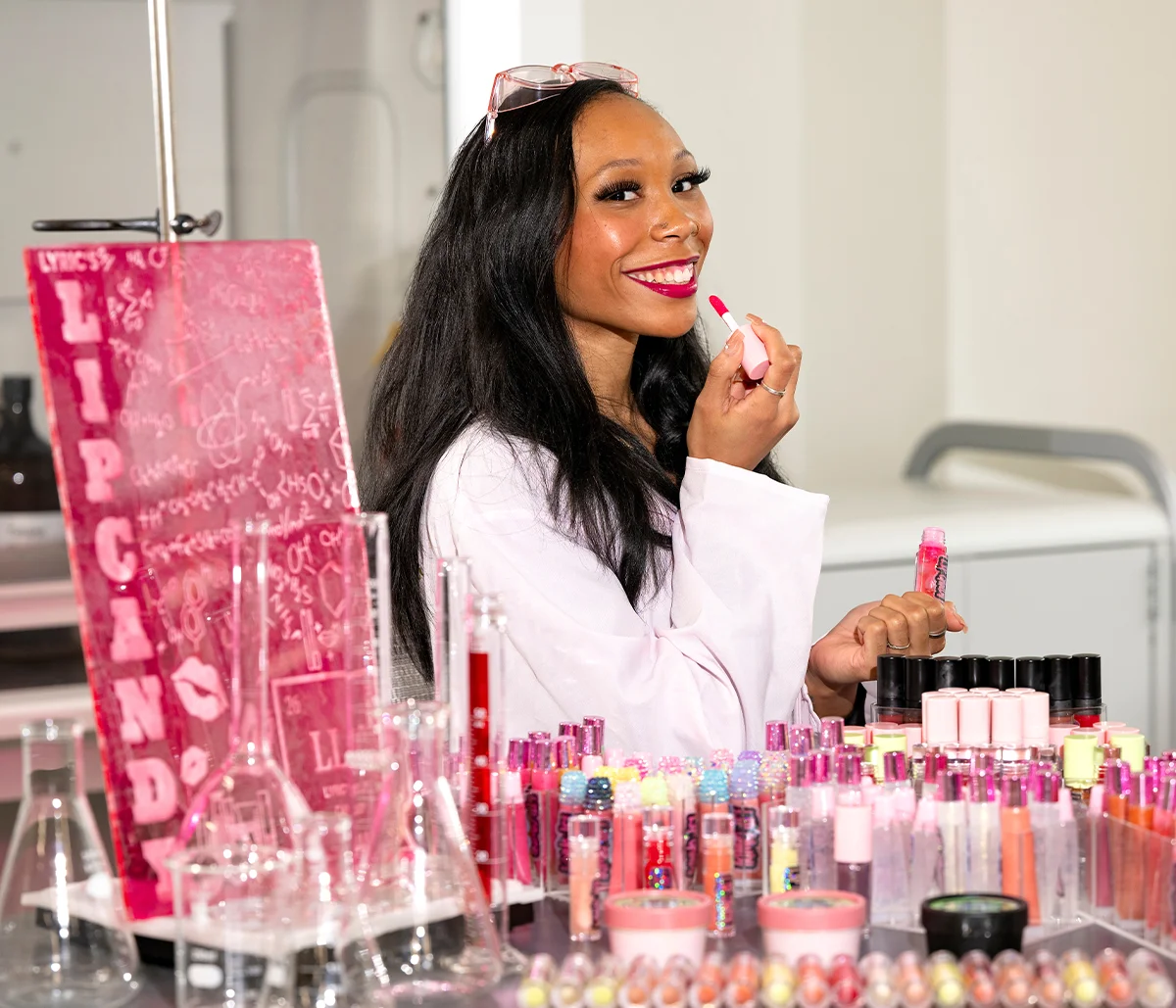

or nearly a decade, the Nifty Idea Fund has driven innovation on Bucknell’s campus. Recipients of the fund’s $500 microgrants gain the financial support to purchase essential supplies and equipment that enable them to transform their imaginative concepts into tangible products.
By collaborating within campus makerspaces with other curious, inventive creators, fund recipients have developed an array of diverse projects — including a Tesla coil device that turns electrical sparks into music, a Bernoulli Blower exhibit for the Lewisburg Children’s Museum, a heated phone attachment that protects devices and extends battery life in extreme cold, and a blockchain board game.
Each project is as unique as the student who dreams it up. Here are three who took their “nifty idea” and ran with it.
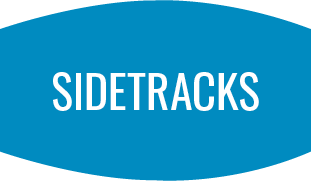
Changing His Tune
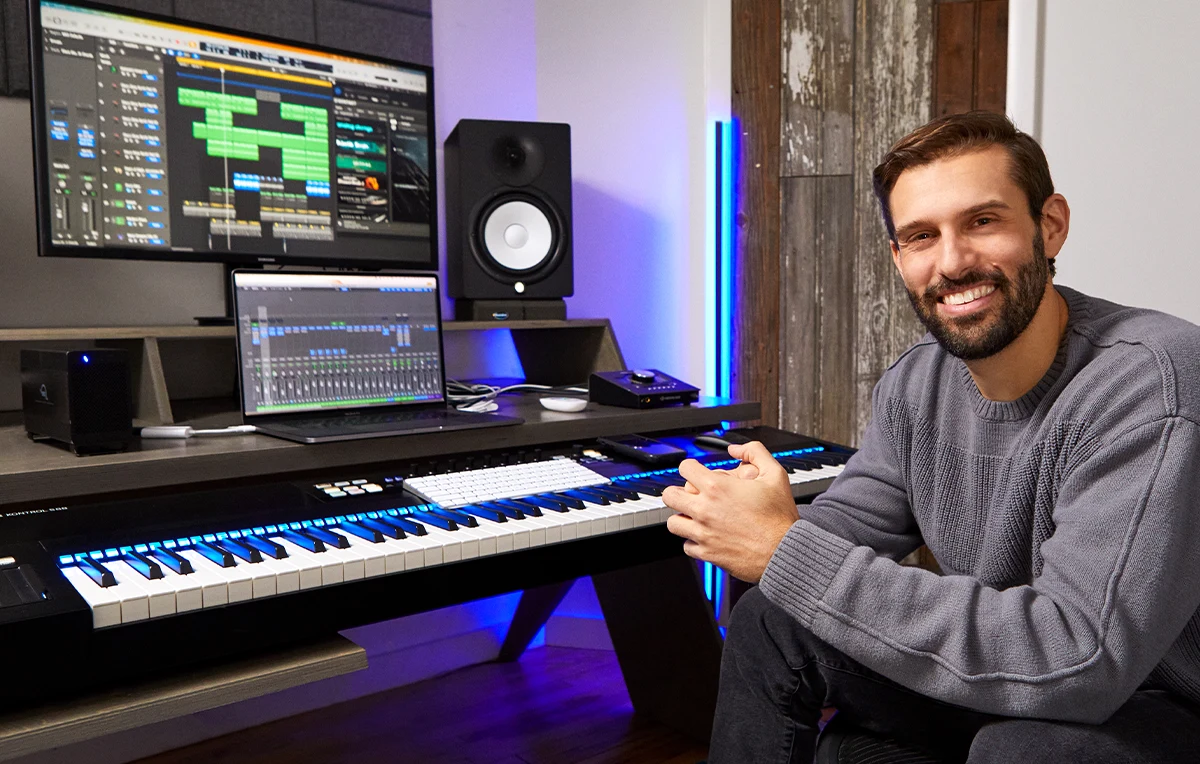


Features
Redefining Entrepreneurship

photograph by April Bartholomew

o solve critical problems and spark meaningful change across any industry, you need innovative thinkers and resourceful problem-solvers. You need people who are versatile, who view challenges as opportunities and don’t flinch at risk or adversity. You need the people who, above all, are determined to add value to the world. You need entrepreneurs.
Bucknell has furthered its commitment to entrepreneurship education with the launch of the Perricelli-Gegnas Center for Entrepreneurship & Innovation, made possible by a founding gift from Scott ’94, P’25 and Susan Gegnas Perricelli ’94, P’25. “We’re excited for the ways this new center will connect Bucknell’s three colleges and ensure that all students have the opportunity to strengthen critical skills,” Sue says. “It will be a hub for entrepreneurship for the entire Bucknell community and a differentiator for Bucknell.”
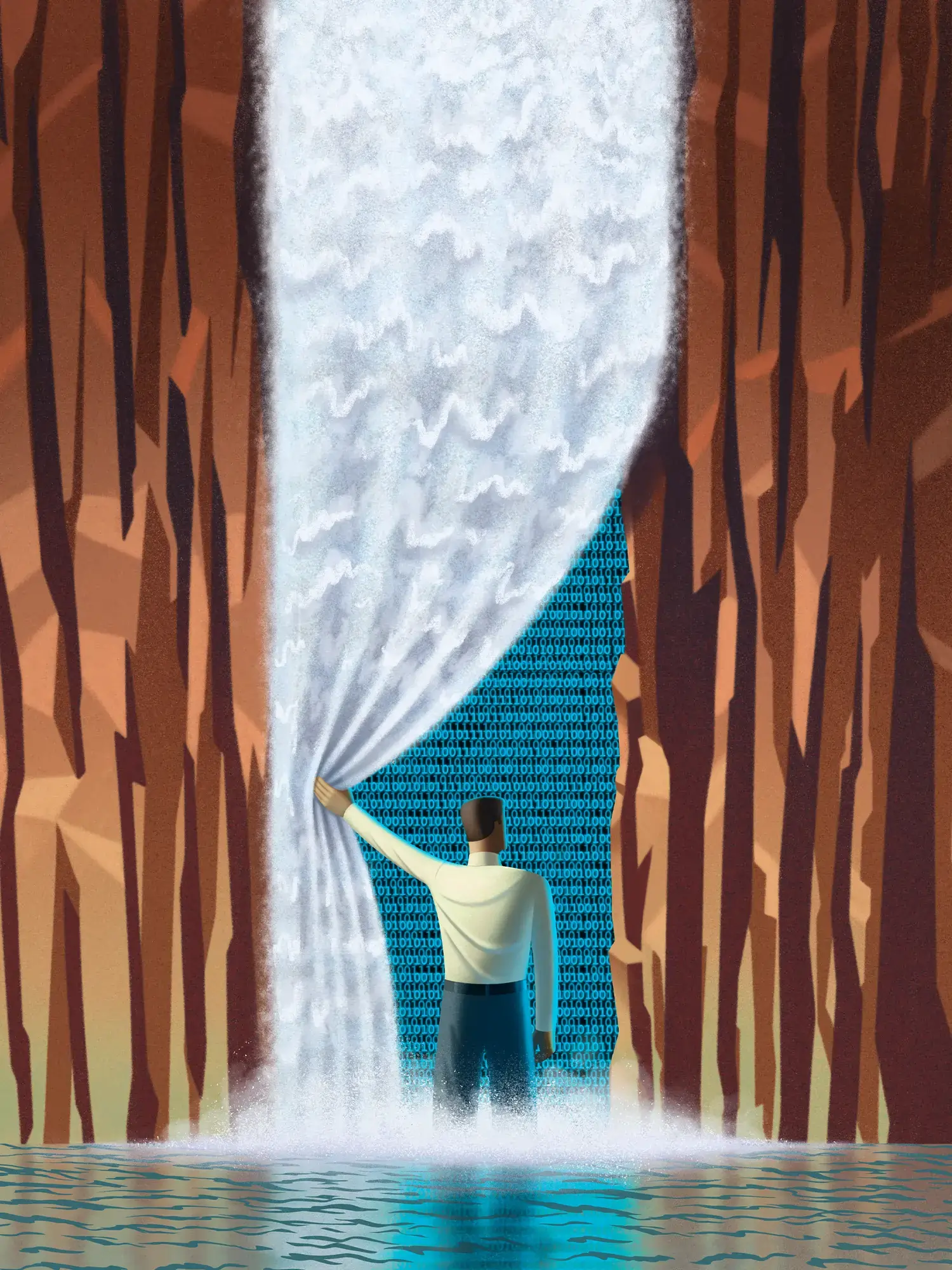
The Data Science Revolution
The world is made up of data. Bits and bytes of information flow through nearly every aspect of our lives, from our internet habits to how our bodies function. But what does it mean to live in a world increasingly defined by data? Discover how Bucknellians are advancing the field of data science to better understand and unlock the potential of the data around us.
by Matt Jones
illustrations by Jon Krause

hrough humanity’s scientific pursuit of knowledge, novel ways of seeing have been developed to reveal what was previously hidden from sight. The invention of assistive machines and technologies have given us the ability to view everything from the microscopic world of electrons and cells to the distant reaches of the universe. But it is perhaps the introduction of modern computing, and subsequently the internet, that has played the largest role in reconstructing how we see the world. Specifically, as one made up of data.
In the same way that matter is the basic building block that undergirds the physical reality of the universe, data is the element that arranges matter into something meaningful to us: information that can be conveyed, interpreted and, with a little finessing, understood. While the concept of data is centuries old, the digital age has imbued the term with a new significance.
With the advent of the electronic computer in the mid-20th century, soon followed the arrival of data processing and data analysis, computer science, data mining and Big Data — disciplines and research paradigms that emerged in response to an existence more and more defined by bytes and bits of numerical code. The same can be said for data science, which is both a discipline unto itself and a reimagining of how to innovatively apply familiar methodologies and systems.


How a cross-college team of students and faculty partnered with staff to solve one of the University’s biggest puzzles
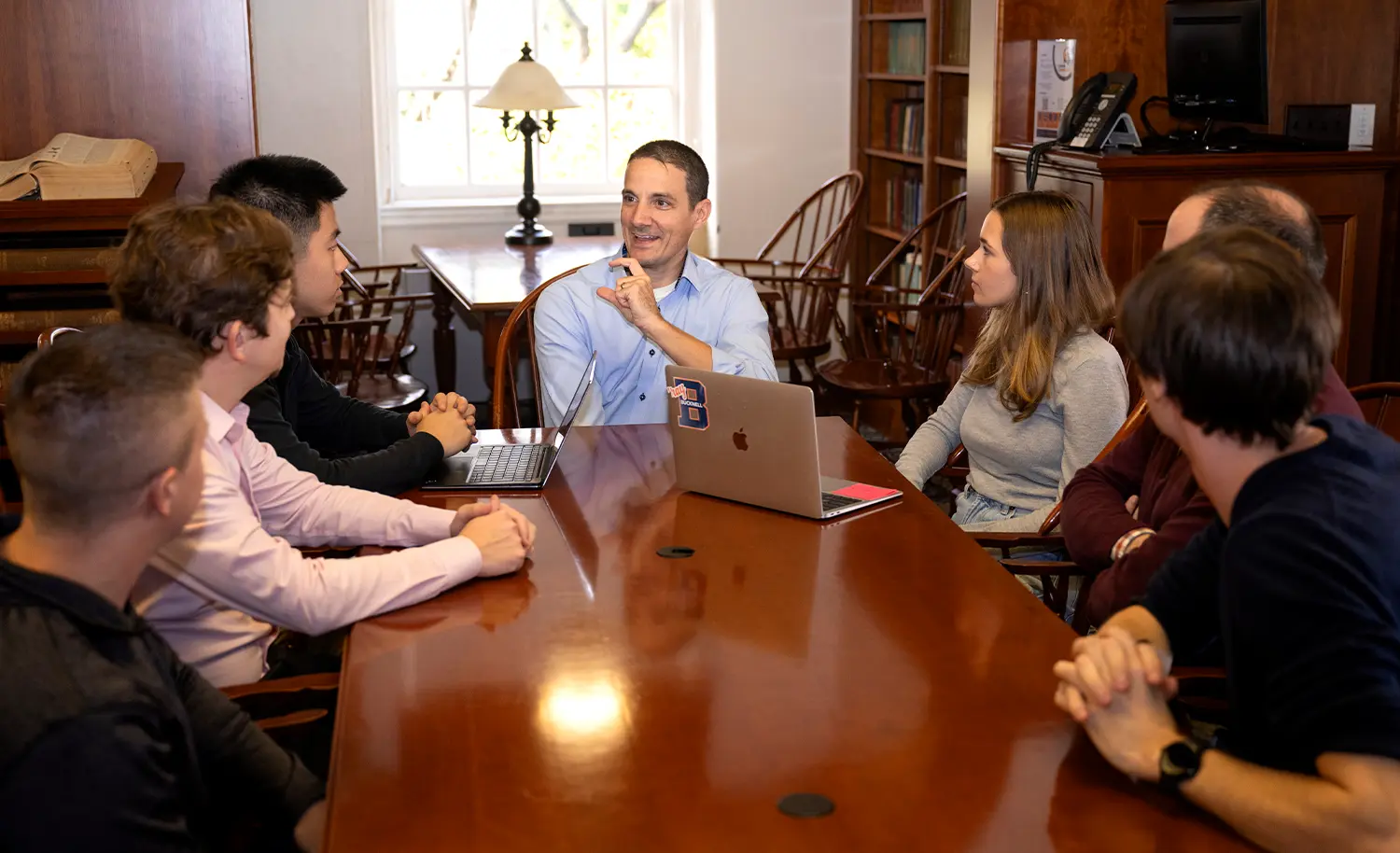
Photo: Emily Paine
The Problem
In A League of Their Own
photograph by Emily Paine

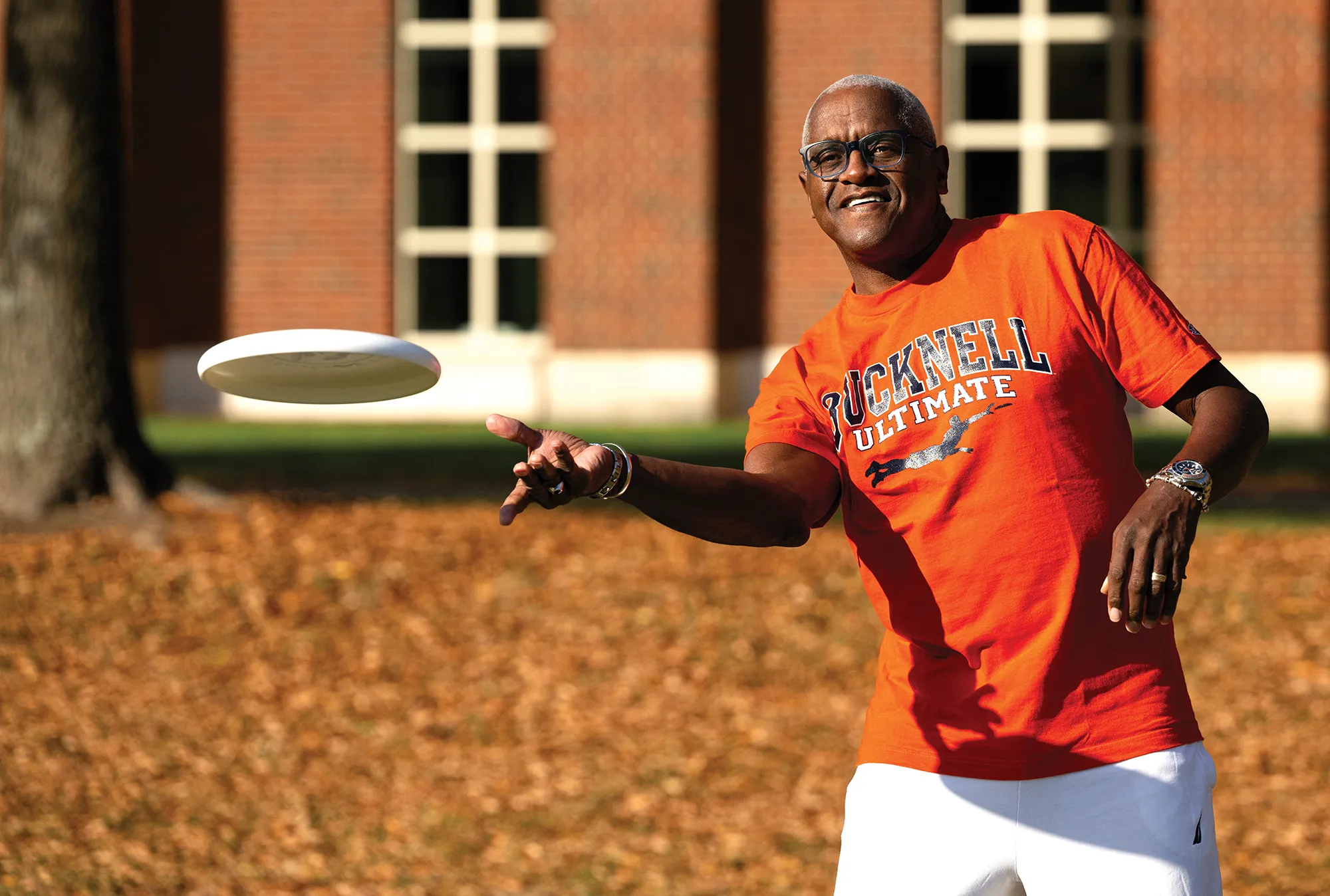
In A League of Their Own

photograph by Emily Paine
The Ironwoman
Ava Warfel ’22
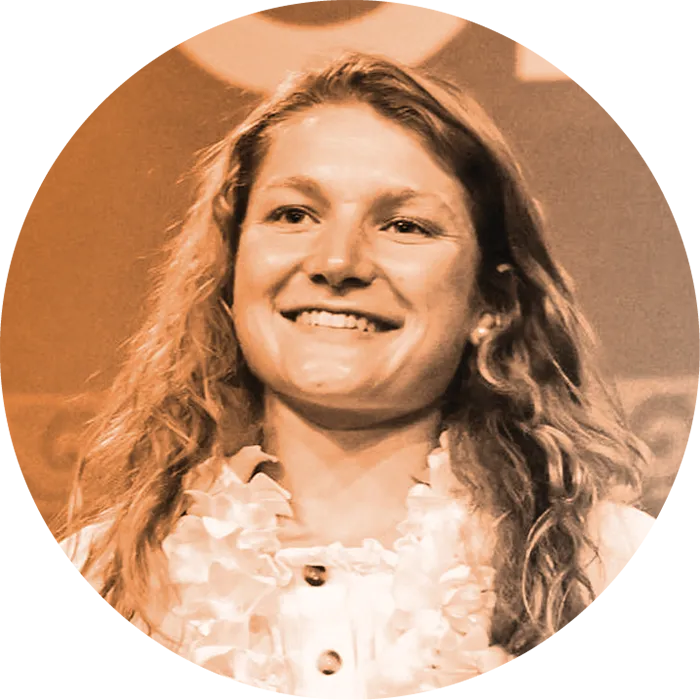
Warfel’s meteoric success is stunning but perhaps not surprising to former classmates. After all, she graduated from Bucknell in just three years — balancing a demanding student-athlete life as a biology major and cross-country runner while working full time as a night-shift paramedic in Lewisburg.
'ray Bucknell
photograph by SAM GODSHALL ’24
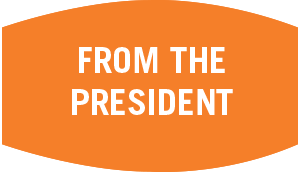
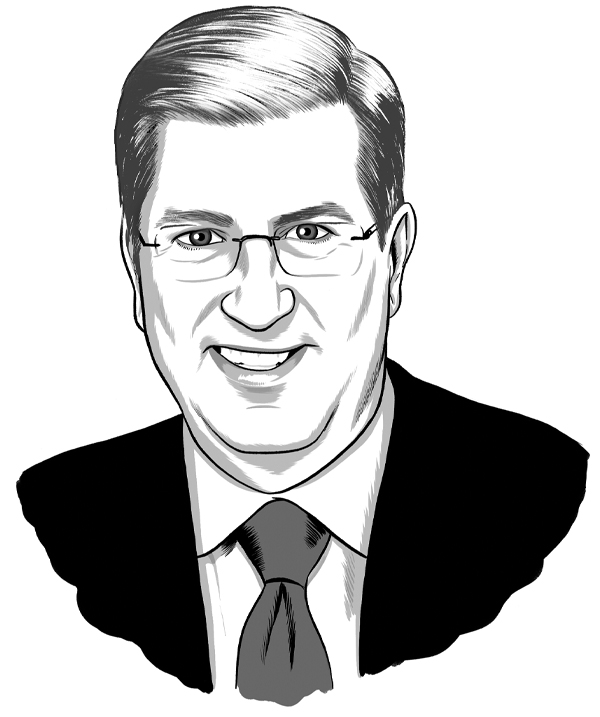
Sustainable Success
I like to say that I ultimately achieved my goal, but I had to become a university president to do it. The Bucknell Farm, planted in 2018 on the south edge of campus, offers 5 acres of opportunity for academic research and civic engagement, as well as thousands of pounds of nutritious produce for the community. It’s one of the many exciting advances the University has made in environmental sustainability — achievements that are gaining recognition. (We define sustainability to include financial and human dimensions as well as environmental ones, but this column will focus on the environment.)
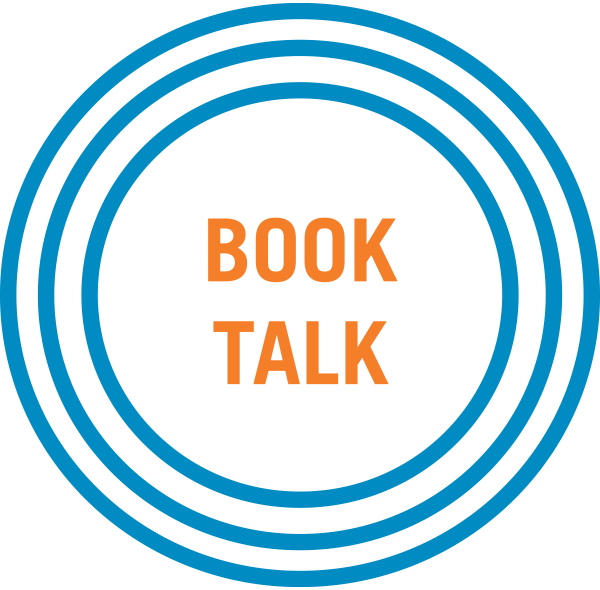
Bite-Sized Appalachia
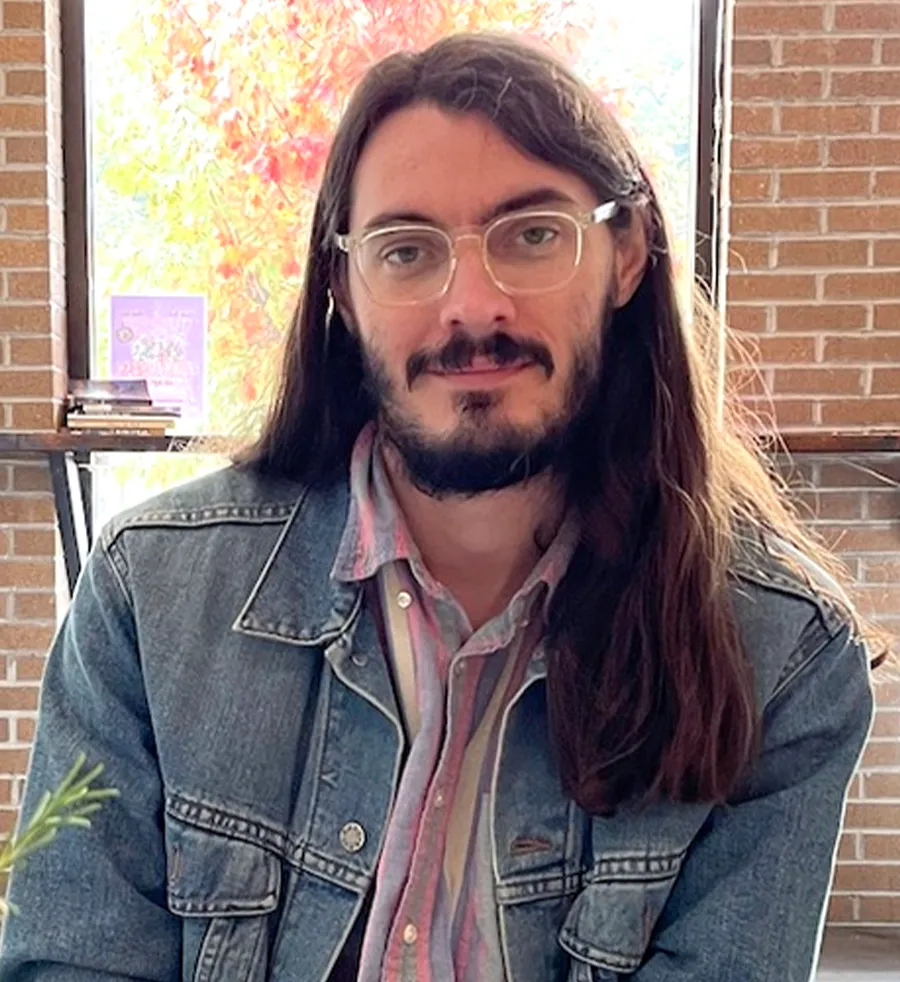
Photo: Rachel Reeher

Truth may very well be stranger than fiction, though fiction can be a helpful tool for understanding the strangeness that pervades much of the human experience. Tucker Leighty-Phillips ’18 uses his writing to mine the sometimes bizarre realities hidden just beneath the surface of ordinary life.
“I found that when I started to de-familiarize, or lean into the surreal or the absurd, I could capture the truth of a thing in a way that the more direct address of it wasn’t doing,” says Leighty-Phillips.
Maybe This Is What I Deserve, his debut short story collection, embraces the absurd as a tool for illuminating and challenging the memories and myths at the heart of his childhood growing up in rural Appalachia. Over the course of 28 flash fiction stories, readers are introduced to a landscape consumed by consumerist impulses and desires. Toddlers imagine themselves as airports. Parents yearn to become chain stores. Kids construct their identities through the lens of their favorite brands. This intentional conflation between what is human and what is commodity, Leighty-Phillips argues, serves to critique common misconceptions about the place he calls home.
Earth Day Special 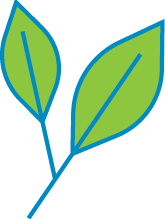
Unearthing Justice
Environmental lawyer Wayne Hettenbach ’90 fights to keep the planet and its inhabitants safe
Hettenbach has spent 20 years working as an environmental lawyer, litigating criminal and civil matters that involve violations of federal environmental laws, including the Clean Water Act and Clean Air Act. In his role as assistant chief of the environmental crimes section of the U.S. Department of Justice, he oversees a team of investigators and prosecutors who specialize in white-collar criminal law as it relates to environmental crimes.
The scope of his work ranges from investigating corporate pollution and wildlife trafficking to prosecuting toxic waste disposal and the falsification of environmental records.
“It’s pretty much like what you see on Law & Order, except our victims are the environment, animals and the public at large,” he says.
Hettenbach says he remembers seeing the effects of pollution firsthand while growing up in coastal New Jersey. Medical and plastic waste washed up on the beaches where he swam; areas where he once enjoyed clamming were closed off due to sewage runoff.
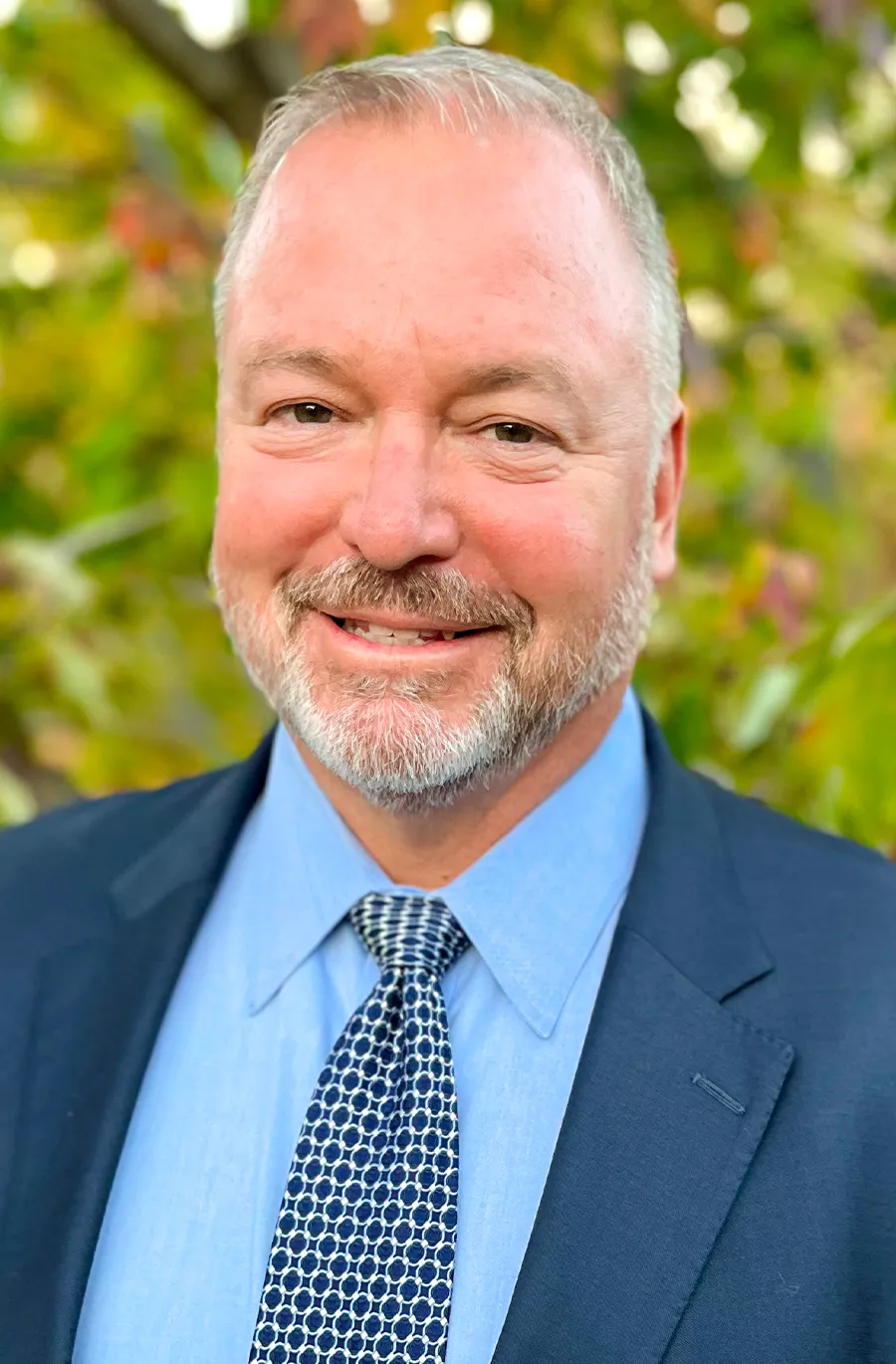

A Bison Protecting Bison
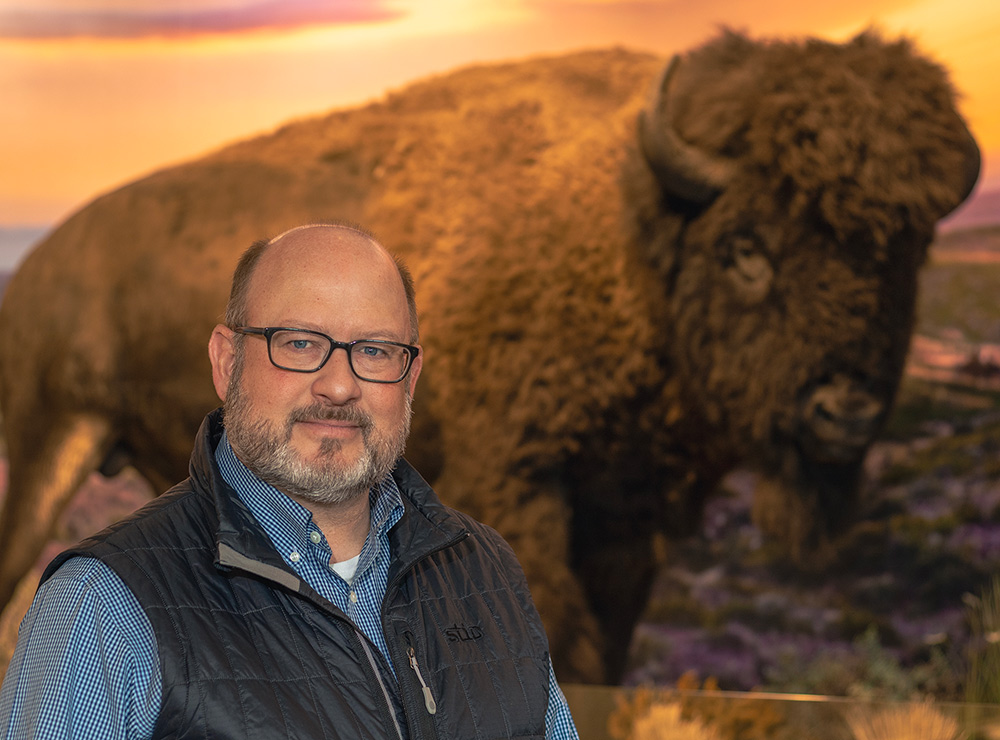
In his role, Cool and his team develop compelling storytelling around American Prairie’s mission in order to build national awareness, engage donors and raise funding to support what he calls “the coolest conservation project you’ve never heard of.” American Prairie’s goal is to connect 3.2 million acres of private and public land to restore a fully functioning prairie ecosystem. By connecting and preserving the vast grasslands in Montana’s Northern Great Plains, the organization strives to restore the biodiversity of the area.

On a Transition Mission
Lesh is the chief commercial officer for Alfen, a Netherlands-based company that builds and implements sustainable energy solutions across Europe. Lesh is tasked with making sure new technologies, like electric vehicles (EVs) and renewables such as wind and solar energy systems, can work with existing energy grids. From her office in Amsterdam, she manages the strategy that propels several key energy-related areas: creating a system of accessible EV charging stations in Europe, implementing energy storage solutions to enable more renewable energy and building sustainable electricity grids for the future.
While studying mechanical engineering at Bucknell, Lesh participated in the Institute for Leadership in Technology & Management program, which helped her see how her engineering expertise could one day be valuable in advancing a business. She then interned at General Electric (GE), gaining exposure to the company’s innovative work on energy systems. She parlayed that into a full-time position after graduation, and for more than 20 years, she helped utility companies generate power from renewable sources. She also worked on creating smarter electricity grids that would make it possible for more people to charge EVs at home.
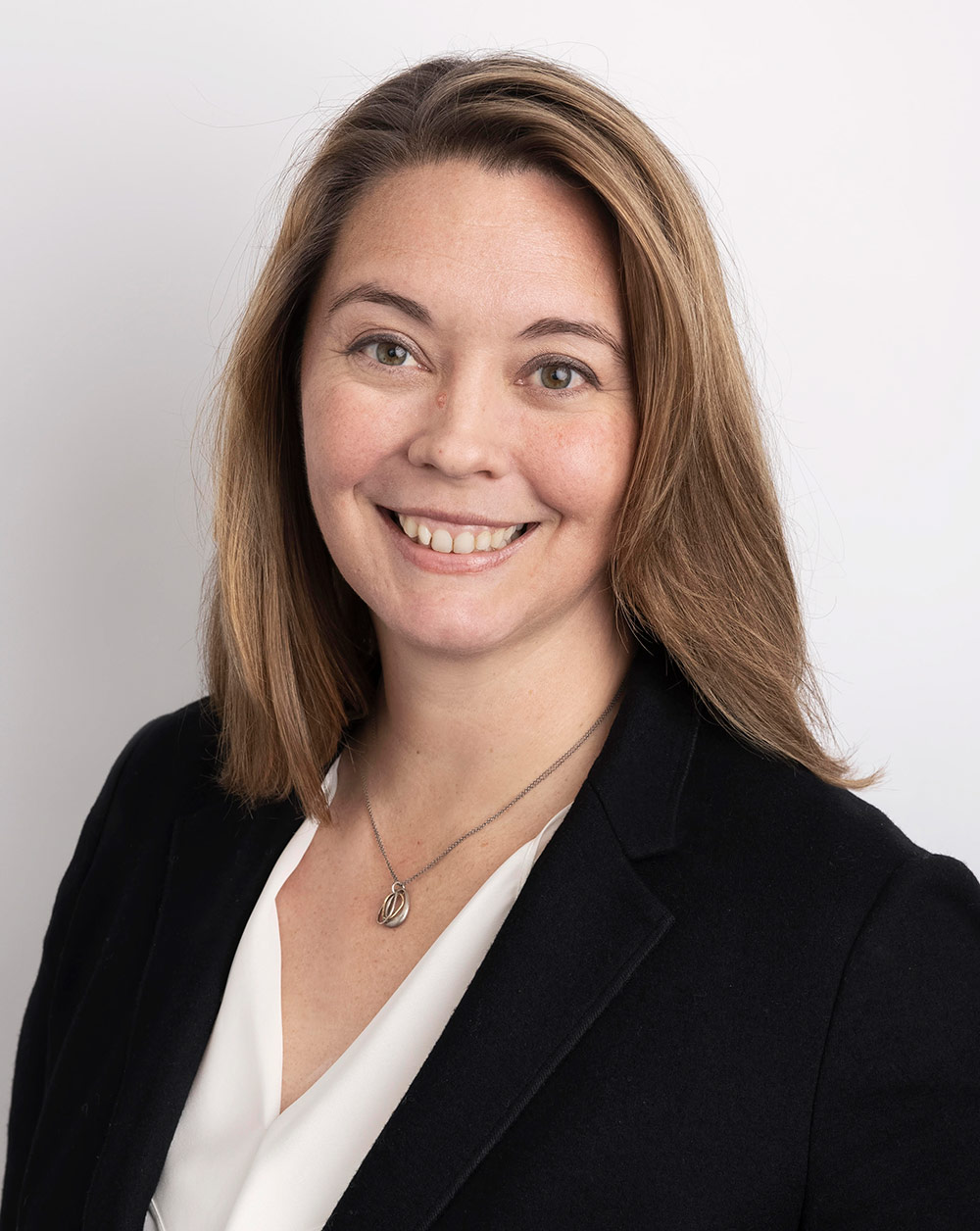

Helping Justice Flow
Campbell-Ferrari is executive director of the Center for Water Security and Cooperation, a nonprofit organization she co-founded in 2015 to spur the creation of laws that promote transparency in water management, address issues of water access inequality, and ensure long-term planning so water resources are managed with a focus on future sustainability.
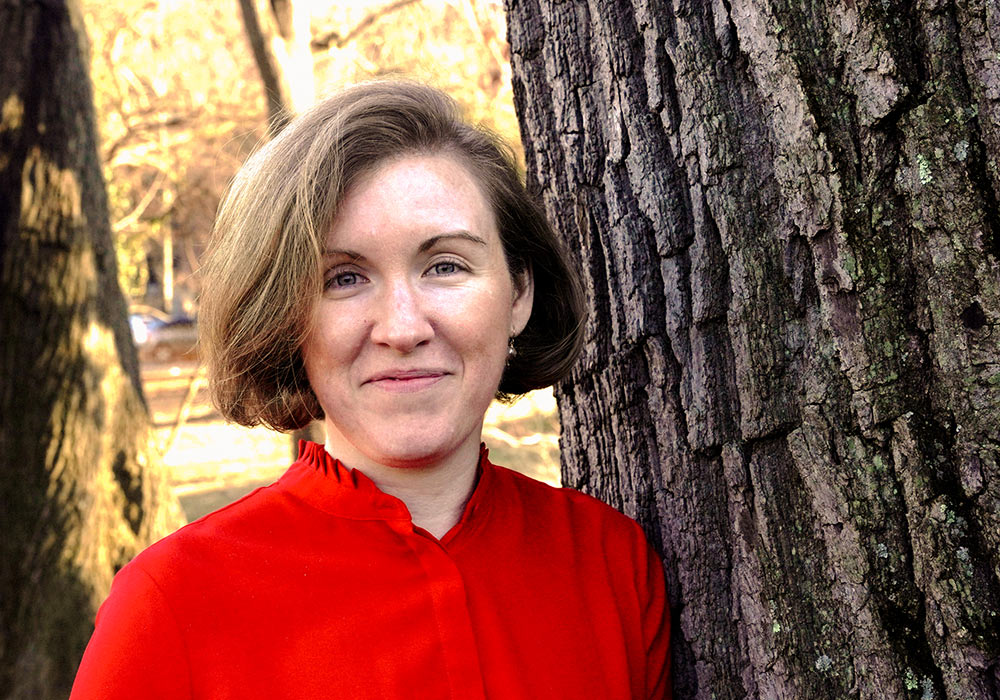

The Cost of Climate Change
One of her focal areas is understanding how the physical effects of extreme weather events and a transition to a low-carbon economy influence the stability of banks and the broader economy. Specifically, she studies how environmental shifts can affect consumer lending for purchases like homes and automobiles. For instance, rising sea levels or floods can pose risks to properties, which has an impact on the terms and conditions of mortgages. And as the world transitions away from high-carbon industries, associated costs could influence credit losses.
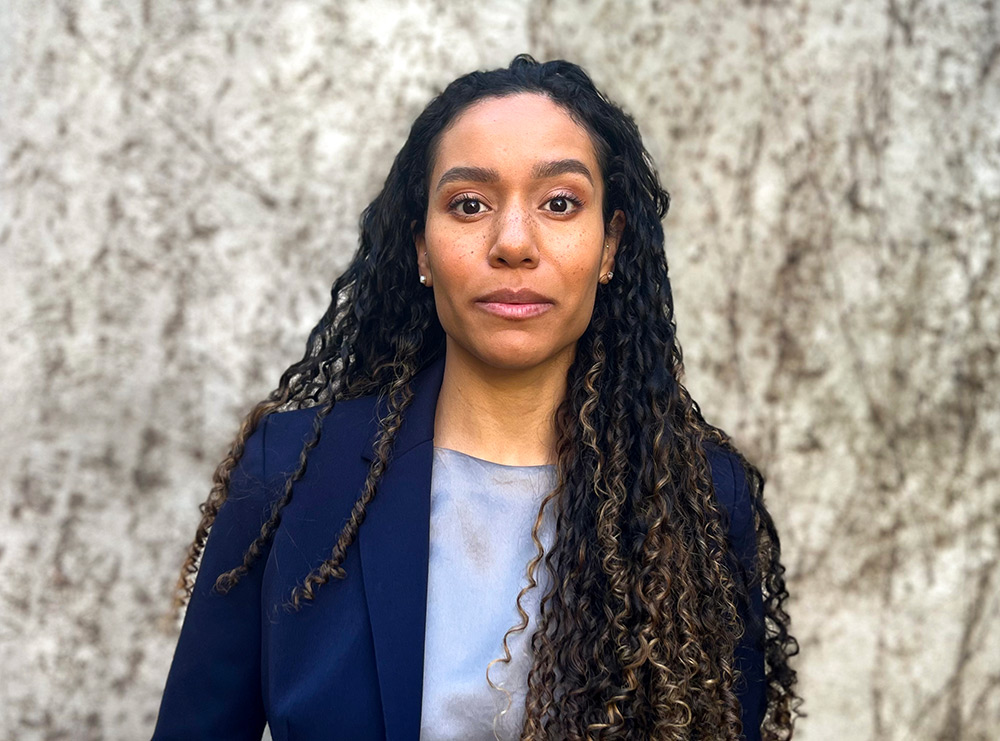
IN MEMORIAM
1939
1941
Darina Tuhy, Sept. 27, Wilkes Barre, Pa.
1943
1944
1945
1946
1947
1949
Mel Broome, Oct. 27, Sunbury, Pa.
William Davis, Dec. 2, Lancaster, Pa.
Edward Staiano ’58, M’60, P’85, G’14
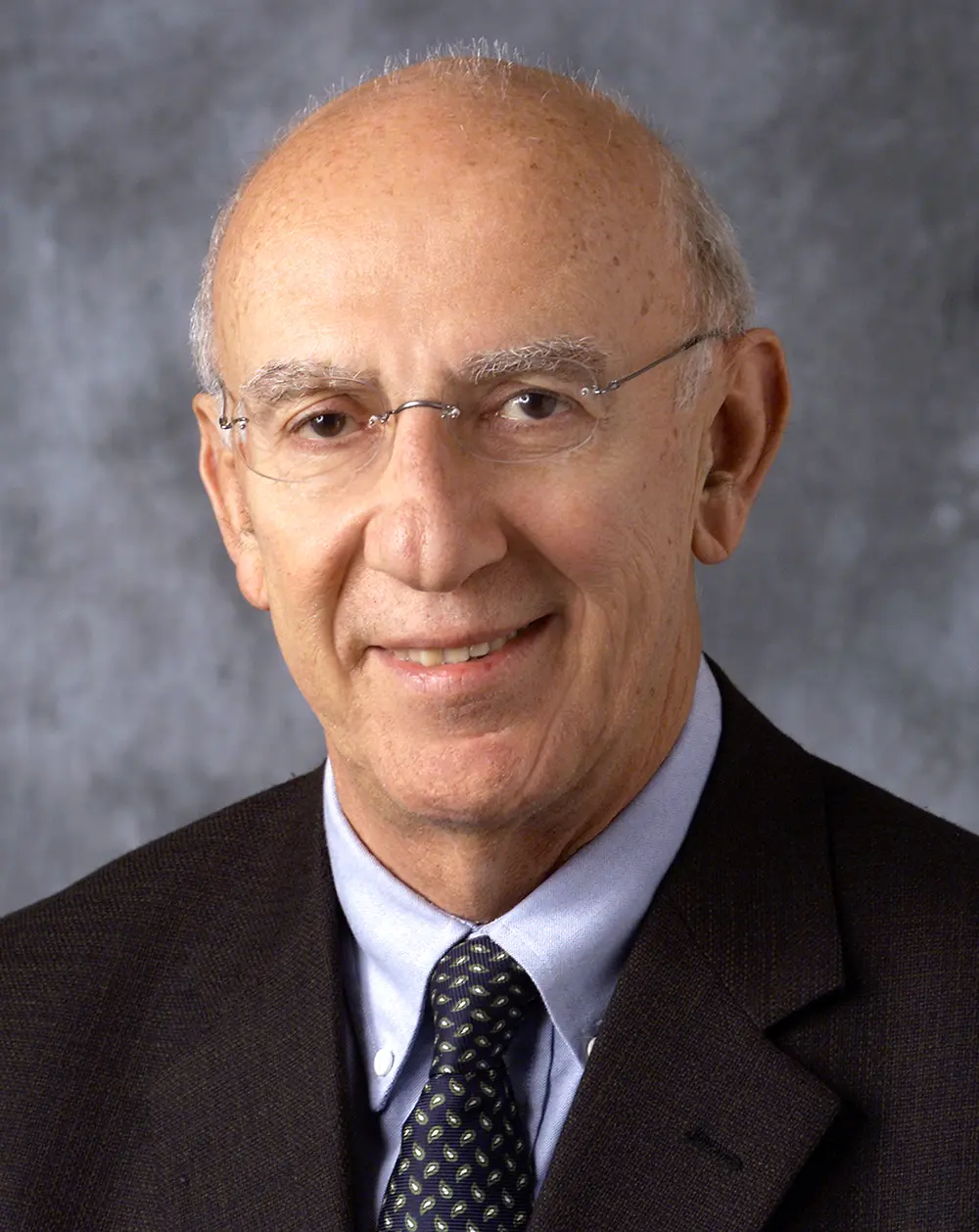
Photo: Courtesy of Special Collections/University Archives
Staiano also served as the director of the Freas-Rooke Computer Center. Although he left Bucknell in 1967 to complete his doctorate at the University of New Mexico, he returned to teach until 1973. Recognized for his forward-thinking approach, Staiano helped to establish the Computing Center as a campus-wide facility.
He and his wife, Janet Smith Staiano ’58, P’85, G’14, established the Dominick & Martha Staiano Scholarship (named for his parents), which benefits deserving students in the College of Engineering.
For the second half of his career, Staiano worked at Motorola, where he eventually served as executive vice president, president and general manager. The Washington Post reported that under his leadership, the cellular division grew to become Motorola’s largest business. In 1999, he founded The Sorrento Group, a venture capital firm through which he supported small business entrepreneurs.
He is survived by Janet; his daughter, Eva Staiano Tomashefski M’85, P’14; three grandchildren, including Tony Tomashefski ’14; and six great-grandchildren.
DO
Nominate a Bucknellian!
Tune In to Commencement

Get Career Advice
Mark your calendar!

Write to Us

Answer This:
Check Out a ‘Best Feature’ Film
Crowdsourced
What is something at Bucknell that you absolutely loved being a part of?
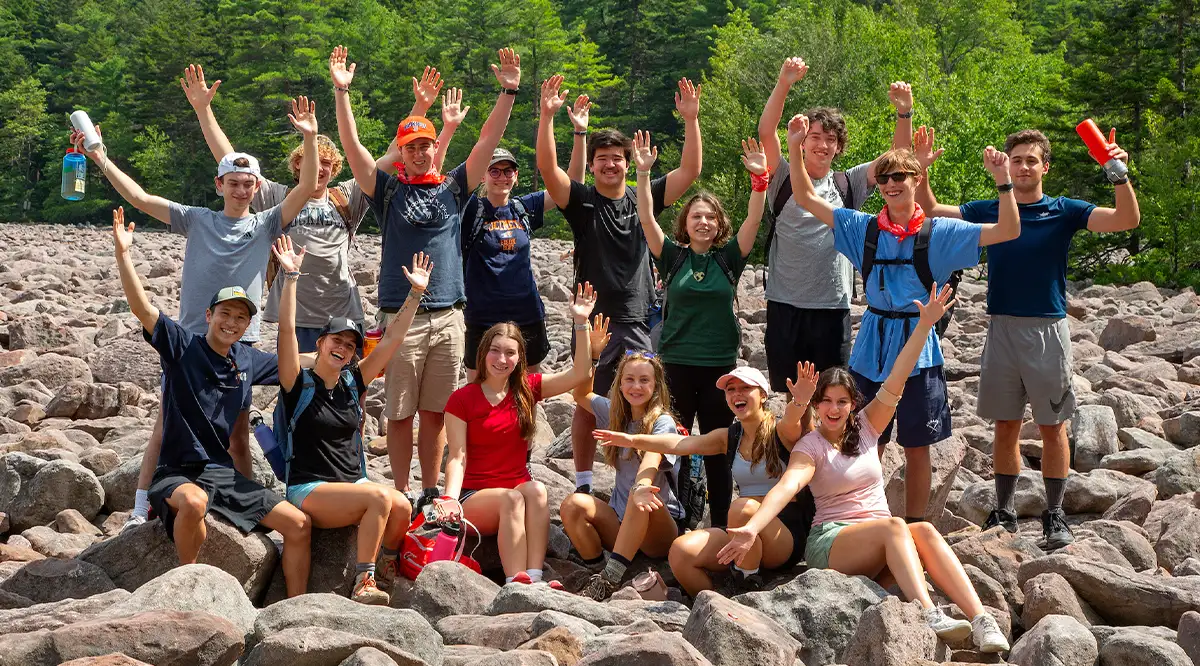

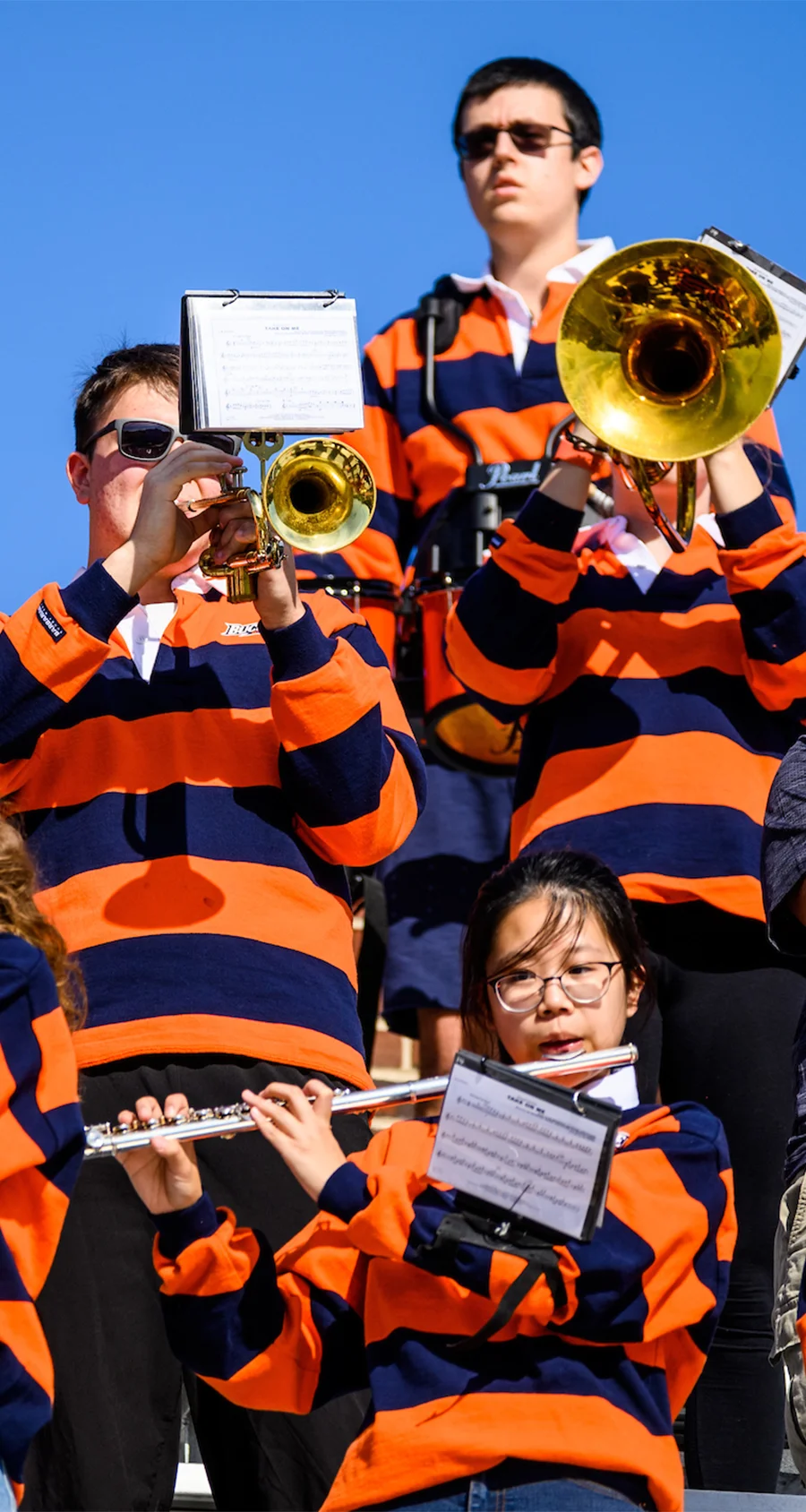
Caption Contest
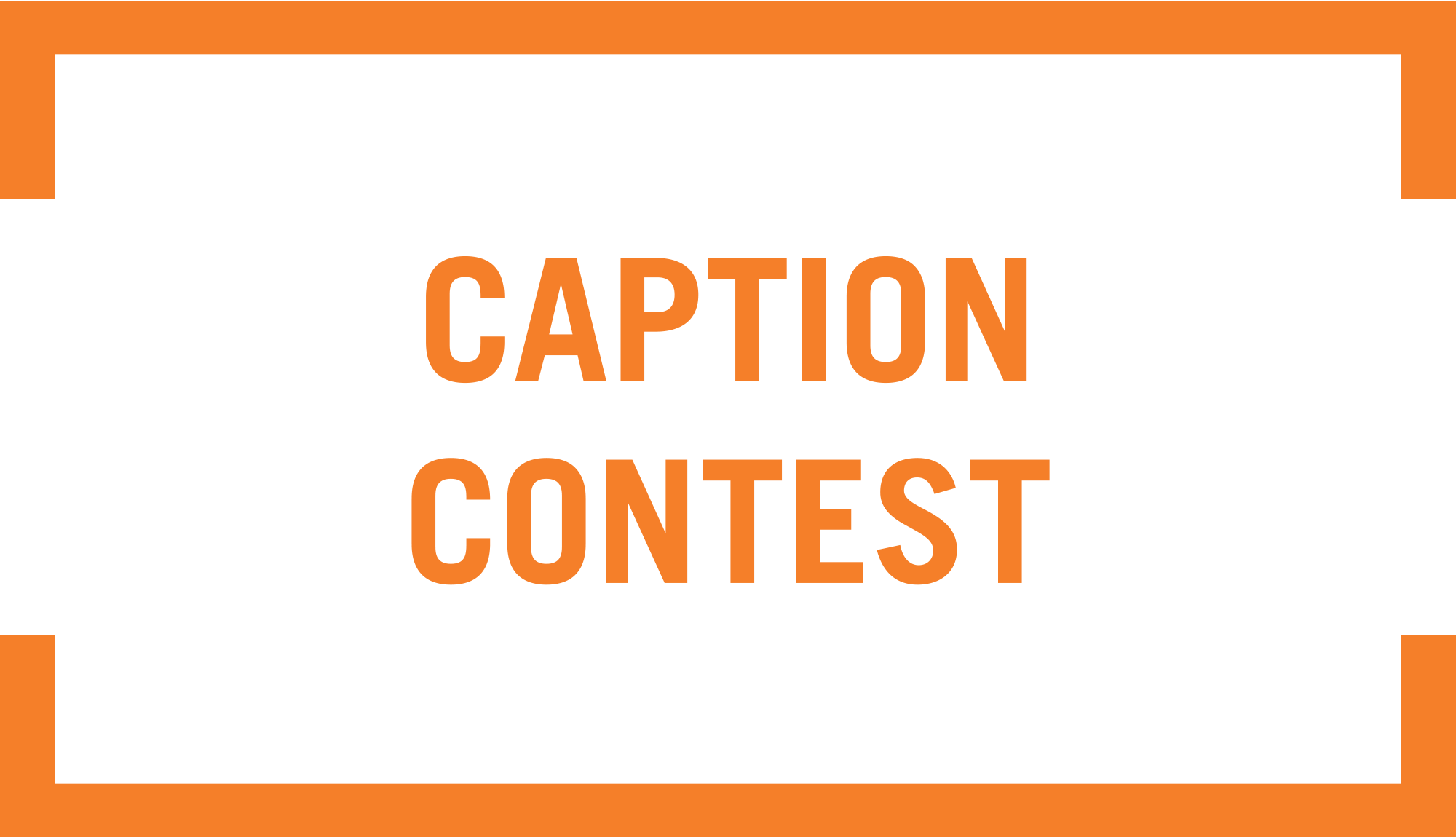
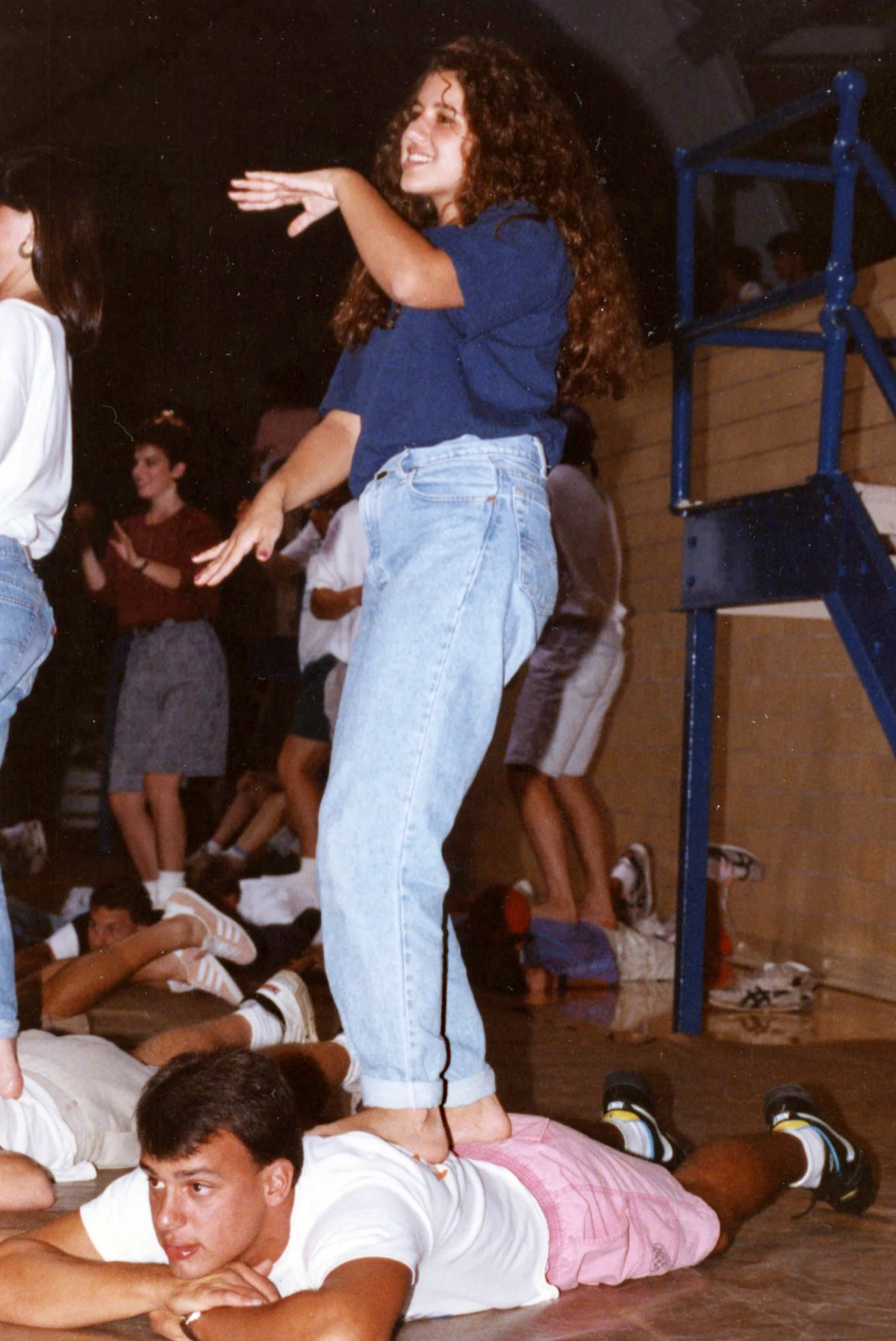
Witty Winners
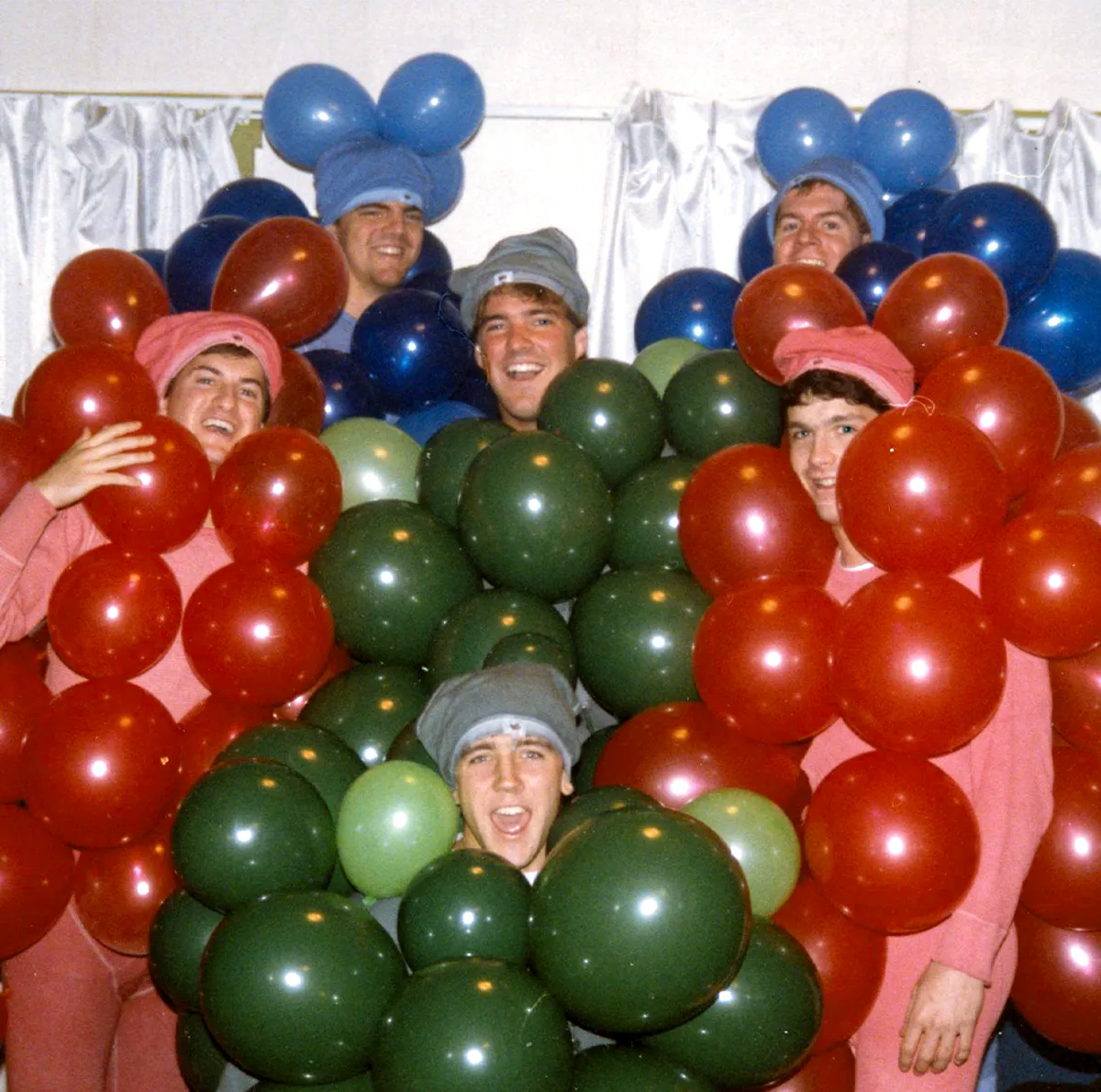

Submit your caption for the retro photo on the opposite page to bmagazine@bucknell.edu by April 22.
(Indeed, Jane married Michael Gamboli ’86, pictured middle row, far left.)
The Backstory
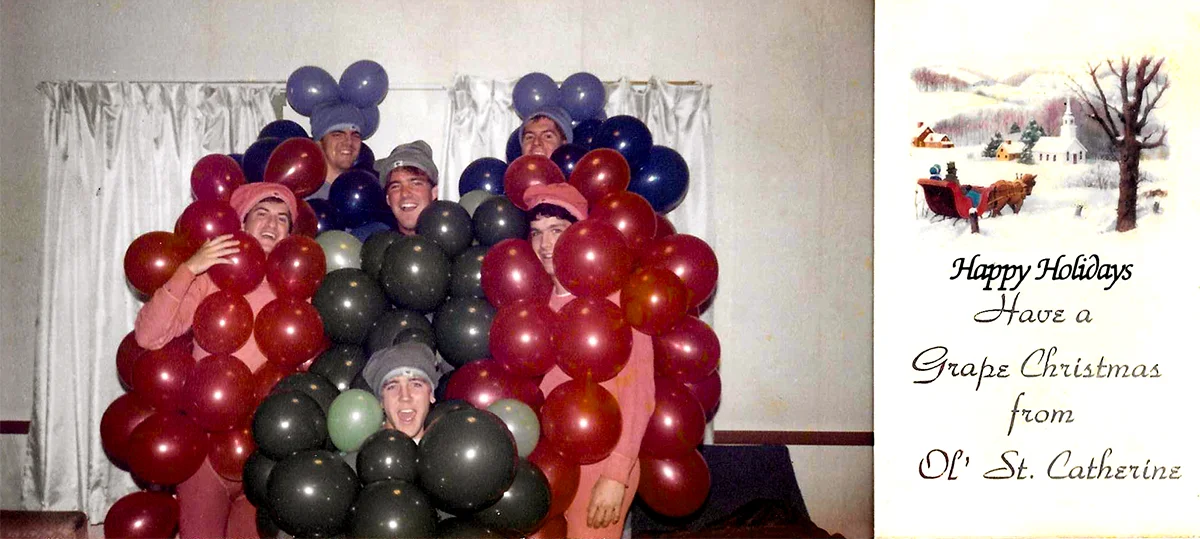
The six of us were Phi Kappa Psi brothers and the first student residents of 611 St. Catharine Street our senior year. One of our girlfriends was hosting a Halloween party. She and her roommates encouraged people to dress up so they could vote on the best costume.
So we decided to get creative. We came up with the idea to be the Fruit of the Loom “fruit guys,” who were iconic characters from television ads in the 1980s. We didn’t want to put in the effort of coming up with the apple and the leaf, so we focused on the grapes.
We went to the store the day of the party and bought our supplies: long underwear, boys’ briefs, balloons, safety pins and clothing dye. We dyed the long underwear and the briefs and then blew up the balloons and pinned them on each other. We laughed the entire time. We thought we were hysterical.
I took this photo before we left for the night. Of course, we didn’t have iPhones, so I used my film camera on a tripod with the self-timer.
We went to two or three parties and stopped by the Bull Run Tap House before we went to our ultimate destination. Making it through doorways took coordination. We’d have to enter in a single file and then group up. Going to the bathroom, as you might imagine, was also complicated.
We were a huge hit. Out on the streets in Lewisburg, we got lots of hoots and hollers. We felt so good about our costume. We were so confident, so pumped up. We knew we were going to win the contest.
But just before the judging occurred, a girl at the party thought it would be funny to take one of our pins and pop our balloons. Boom, boom, boom, boom! And with that, it was over. We went from grapes to raisins in a few seconds. It was deflating.
This picture brings back so many great memories of our time at Bucknell. And now, we’re grape-ful that other generations of Bucknellians are enjoying it too!
Host a Bison Gathering
by Katie Neitz
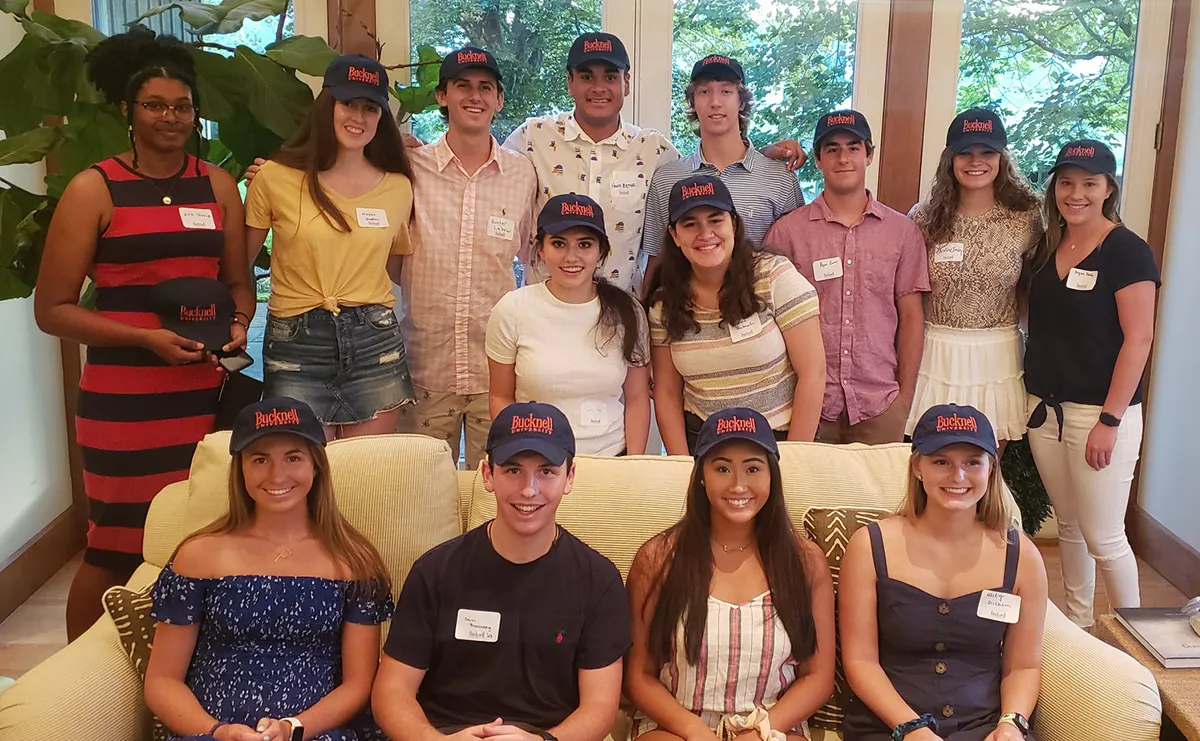
Bison Gatherings, a cherished Bucknell tradition, are resuming this summer after a four-year pandemic-related hiatus. Bison Gatherings serve as a bridge for incoming first-year students and their families to connect with current students, parents and alumni who live in their area as well as University staff who are able to provide insights into life at Bucknell.
Gatherings unfold in various settings — in backyards, at community centers and around kitchen tables — across the country. They offer a warm and inviting environment where incoming students and families can pose questions, make connections and feel part of the Bucknell community. For many, it marks the first step toward forging friendships and creating a network that will extend far beyond their college years.

